If These Walls Could Talk
Have you ever looked up at one of Bemidji’s historic downtown buildings and noticed names like M.E. Ibertson, Dalton and Troppman Block inscribed in the bricks?
Those are three of the structures named for their
founders. We thought readers might like to learn more about them, so the Pioneer decided on the theme for this year’s Annual Report: “If these walls could talk.”




With immense help from local historians Cecelia
(Wattles) McKeig and Sue Bruns along with the Beltrami County Historical Society, reporters dug into the history of 14 buildings in the downtown area. McKeig, who grew up in Bemidji, is prolific in her research and knowledge
of the community and has written several historical books. Bruns, a board member of the BCHS, is a retired teacher who enjoys exploring the town’s history. We couldn’t have completed this project without their crucial help
and deep understanding of Bemidji's past and present. Of course, there are many other buildings with many more stories, but we hope our readers will enjoy learning about these select few we chose to feature in this special section.


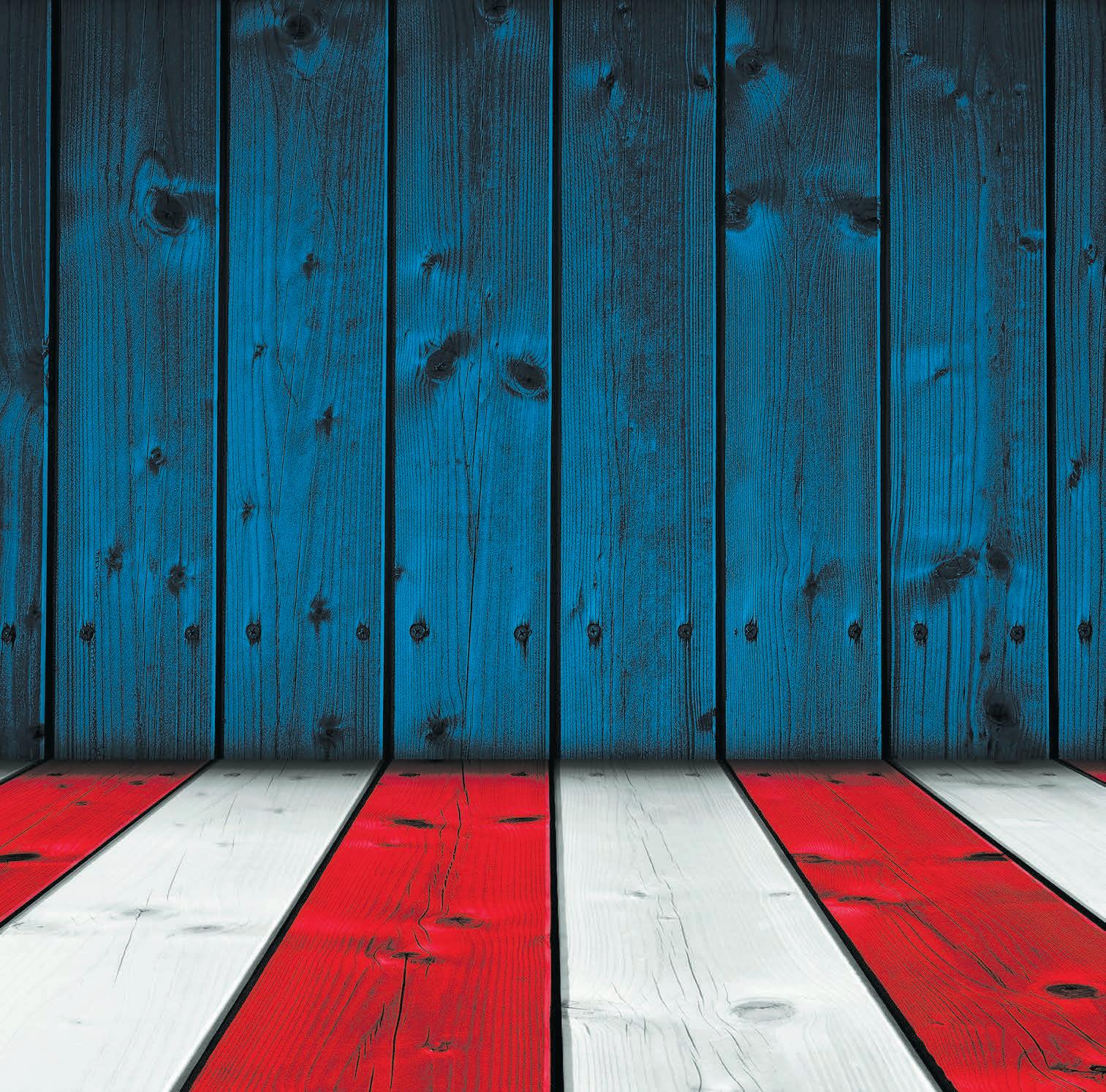
Gas Rewards Program • First & Best Gas Reward Program In Bemidji • No Limit To How Much You Can Save • Double Stamps On Tuesdays • Earn A Dollar For Every 20 Stamps, No Limit • No Need To Drive To Redeem Stamps on Gas, You Can Fill Up & Save Right Here At Marketplace Express Convenience Store • Save An Additional 3c A Gallon When You Sign Up For A Shell FRN Reward Card. Simply Pick Up An Application At The Gas Station & Save! • Save Even More With A Shell Credit Card! • Non-Oxy Gasoline We continually strive, in everything we do, to bring value to
customers without
quality. Quality
are always in search for the best products.
grown if available. Delivered to you
quickly as possible to maintain freshness. Passion
who works for us has an inherent
to provide a knowledgeable,
Curbside Pickup AVAILABLE! 2000 PAUL BUNYAN DRIVE NW Online Shopping! www.marketplacefoods.com
our
compromising
We
Locally
as
Everyone
enthusiasm
pleasant and safe experience to our customers.
2023 Annual Report | Saturday, August 26, 2023 | C1
By Dennis Doeden
The Bemidji Pioneer


Mitch Rautio loves downtown Bemidji, and he’s on a mission to preserve the character of some of the older buildings that he owns.
“It’s so nice to keep the buildings as close to original as possible within reason,” Rautio said. “It’s great to have all the character of the downtown. Nothing against Maple Grove; what did they try to create? They tried to create an old-looking downtown. We have it. Let’s keep it.”
Rautio came to Bemidji from his hometown of New York Mills in 1991 to attend Bemidji State University, where he studied construction management and played football and baseball. He met his wife, Janna, at BSU.
They lived in the Twin Cities for a few years but returned to Bemidji and bought Keg N’ Cork Irish pub, which they owned for 18 years. They still own the building but sold the restaurant in 2019.
“About halfway through that I realized you never put enough money away for retirement,” Rautio said. “My life and what I went to school for was construction. So I decided to start buying buildings, fixing them up, renting them out and just getting them to cash flow for themselves.”
Besides Keg N’ Cork, he now owns another seven buildings downtown, including the M.E. Ibertson building at 405 Beltrami Ave. NW. Rautio runs his businesses — Specklebelly Properties, Puddle Duck Properties and Back Country Construction — from offices on the second floor of the Ibertson building.
“They’ve all been downtown just because it’s a wonderful place,” Rautio said. “We love the downtown through and through.”
The Ibertson building site, known as Block 11, Lot 10 of the Original Townsite, was purchased for $100 in 1899, three years after the village of Bemidji was incorporated. Like many early buildings downtown, the original structure was made

the of

of wood. M.E. Ibertson lived in that building and in 1907 opened a funeral home there. Ten years later he decided to construct a new brick building on the site.
A Bemidji Pioneer story in 1917 reads:
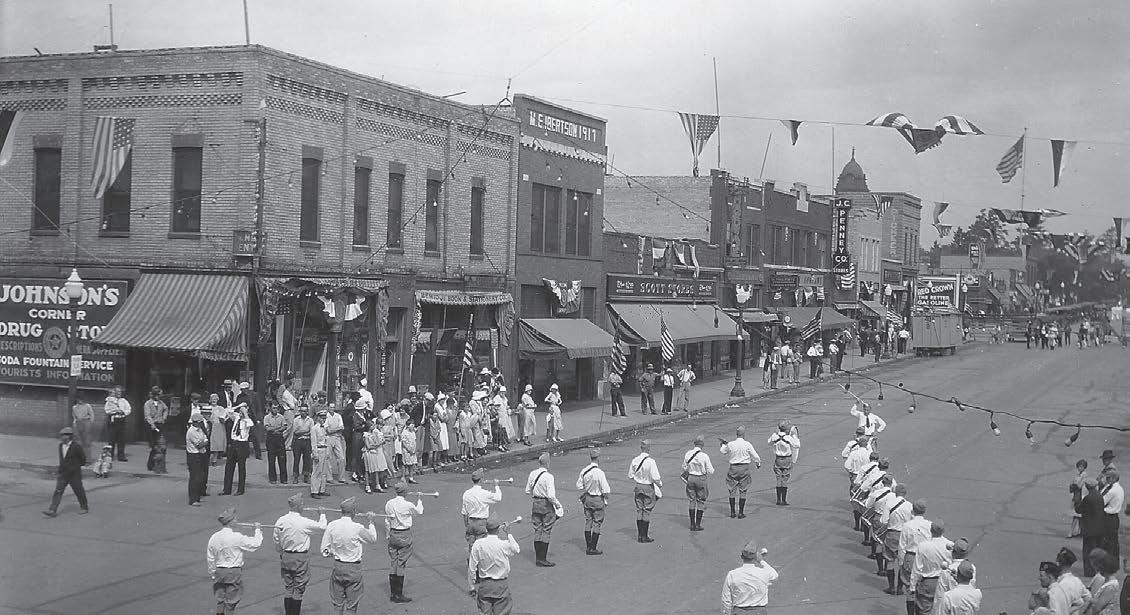



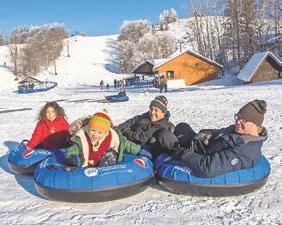
“M.E. Ibertson isn’t holding back in his intention to erect his contemplated handsome brick business building, to be

two stories and replace the present frame structure on Beltrami Avenue. … The frame structure will be moved undoubtedly to the rear of the lot, to make way for the new brick structure.
“The building will be modern in every detail and on the second floor will be offices. The steel for the new building has been purchased and
is scheduled to arrive soon. When completed, the building will have involved an approximate outlay of $10,000 and will be a welcome addition to the business district.”
In 1936, Ibertson moved his funeral home to a new site at Bemidji Avenue and 10th Street, and a Coast to Coast store opened in the Ibertson building.
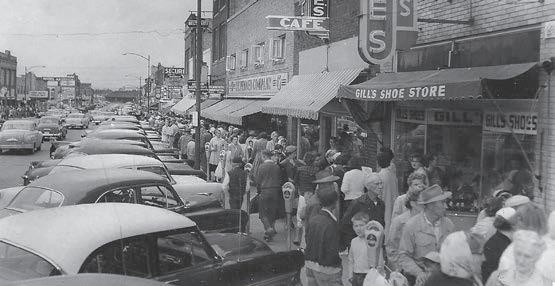
Dean and Donna Beattie of Lake Region Paint and Decorating Center bought the building in 1989 and opened Downtown Decorating, which they ran until 1996. Later, Snow Goose Gifts moved from Union Square to the Ibertson building and remained there until 2006.

Paul Iverson, who owned Iverson Corner Drug next door, bought the building in 2006 for his Progressive Health Care business. In 2011, structural damage was discovered on the front of the building.
A metal support beam had rusted through and the entire
brick front had to be replaced.
“We redid the front exactly to the way it was before,” Iverson said. The name M.E. Ibertson was replicated near the top.



Minnesota Public Radio’s Bemidji operations were on the second floor of the building for many years. Sadie Rae’s Quilt Shop has been located on the main floor since 2021 but will be moving out and relocating to Wilton next month.
Rautio bought the building from Iverson in 2021. He’s optimistic about the positive changes he is seeing in downtown Bemidji.
“I have a goal to put a historical plaque on the front of each one of my buildings,” Rautio said, “with information about when it was built and what it was built for. I think there are currently some new building owners downtown who are excited about revitalizing things. We have such a jewel to be on the lake.”
2 | ANNUAL REPORT | Saturday, auguSt 26, 2023 | The Bemidji Pioneer BemidjiPioneer.com •Skiing •Snowboarding •Season Pass Membership •Tubing •Rentals •Cafe •Lessons •Summer/Fall Events •Business Gatherings •Weddings OPEN HOUSE NOV. 18 10-1 Make it a Magical Winter! www.bvskiarea.com • 218-243-2231 Fall Festival Sept. 16 & 17 11-3 Celebrating 74 years! “Buena Vista is home to everyone!” Quote by Lily Schaper, age 5
Photos courtesy / Beltrami County Historical Society
Preserving Character
Downtown
This 1917 photo looking west on Third Street shows a number of wood-framed buildings, but two of Bemidji's most historic brick structures can be seen in the background. They are the Dalton Hotel (now Patterson's Clothing) and Northern National Bank (now the Northwest Minnesota Foundation).
Bemidji
The Ibertson building at 405 Beltrami
Ave.
NW next door to Johnson Corner Drug is shown in this 1932 photo from the American Legion parade.
Crazy Days shoppers fill the sidewalks on Beltrami Avenue
in
this undated photo. Among the businesses shown are J.C. Penney's (now the Headwaters Science Center), Steve's Cafe (now Wasabi) and Gill's Shoe Store (now Formalities).
Opening at 9:05
By Daltyn Lofstrom
The Bemidji Pioneer
Before becoming the bustling Books N More in downtown Bemidji, Gill Brothers Clothing established its presence within the city and in people’s closets.
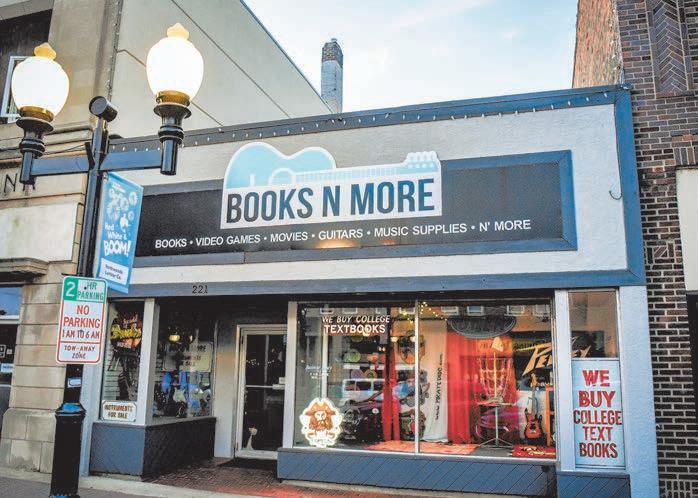
Opened in 1903 by three brothers, Samuel, Phil and David Gill, the store became a family affair meant to serve those in the lumberjack trade and provide heavy, warm clothing for them in the colder months.
The store initially opened at 216 Minnesota Ave. NW just south of the town’s main business street. A devastating fire at 221 Third Street in February 1907 destroyed most of the wooden building at that address owned by Charles F. Schroeder. He immediately built a fine new building on what was left of the foundation. Although owned by Schroeder, Gill Brothers decided that it would be a better location on Third Street next to First National Bank Bemidji, and they made the move into the new building. At first, they shared the building with Schroeder, who retained part of it as his residence.
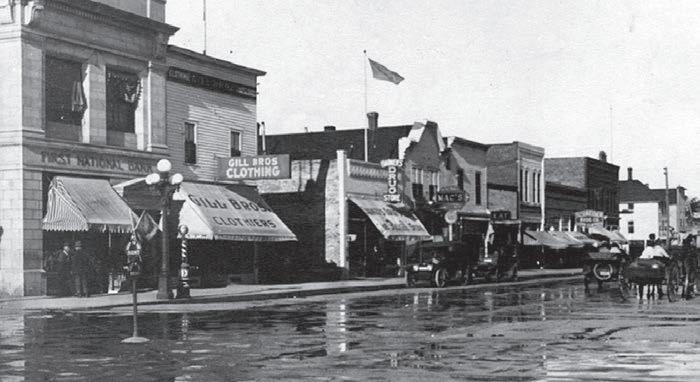
Samuel Gill returned to Minneapolis in 1907, and David bought out his brother Phil in 1929. In 1938, David Gill enlisted his son Bill as a business partner for Gill Brothers Clothing. Bill’s sister Helen worked alongside Bill until 1980 when the pair retired. Another sister, Noreen, opened Gill’s Shoe and Luggage at 419 Beltrami Ave. NW in 1941 and ran it until retirement in 1980.
Bill’s sons Jeff (who lived in Bemidji from 1955 to 1973 before heading to the University of Minnesota) and Jack both had high school jobs at the store and would make occasional appearances in the Pioneer showing off their style savviness whenever the store would be featured in a story.
Such memories have not left Jeff’s head.
“My favorite story … there was a feature of the store where it stated that Gill Brothers opens at 9:05 a.m., meaning my dad would often be five minutes late opening the store,” Jeff recounted, “but it could not have been blamed on the rush hour commute.”
Having long solidified its place in the community, a certain staple of Gill Brothers came into being: the store dog named Penny, a golden lab.
“Sometimes, Roby Aylesworth from the Bemidji Bus Line would
Gill Brothers Clothing served Bemidji for many years
ership by Gill Brothers, Inc.
Bill served Gill Brothers Menswear as its president and remained active in the menswear industry before moving to California upon retirement. He became a member of the Screen Actors Guild and has been featured in “Unsolved Mysteries” among other television shows.
Helen was chosen as the Outstanding Woman of the Year by the Bemidji Jaycees in 1975 and served several prestigious offices in the clothing industry on a national and region-

8,000 stores. Noreen Gill was the first woman on both the National Shoe Board and the Minnesota Retailers Board.
Phyllis Fradet was a seamstress at Gill Bros, but she also worked as a seamstress for the Bemidji State University Athletic Department and for the Minnesota Vikings when they used Bemidji as their summer camp from 1961 to 1965.
Since the Gill siblings retired, the building has gone through numerous changes of ownership. Its tenants include Sullivan’s Clothing, the Bemidji Area Chamber of Commerce, and B&B Comics in the 1990s.

In December 2010, Mark and Rabecca Wilkowski took the helm from KRKB Music Outlet and opened up Books N More. The store started selling textbooks but rapidly expanded. In an interview with Lakeland TV, Mark recalled that the basement had housed studio rooms. When a couple of the music teachers didn’t have a place to go, they wanted to keep using the same studio rooms.

“It just made sense to carry some instruments and sell some consumables such as guitar strings or instrument reeds or things like that,” Mark said.
pick her up on the bus and drop her off at the store on really cold days,” Jeff added. “She loved to sleep in the men’s shoe depart-
ment.”
Apart from local recognition, the store boasted many other accolades for its family members and employees during own-
al level. Specifically, she became the first woman director of Menswear Retailers of America, an organization of roughly



The store has since expanded its offerings to movies, video games, musical instruments and Frisbees – to name just a few items – and the basement is used as well as the main floor.
“We’ve done some pretty good business here,” Mark said. “It’s been a great spot for us.”

BemidjiPioneer.com The Bemidji Pioneer | Saturday, auguSt 26, 2023 | ANNUAL REPORT | 3 www. SECURITYBANK USA .bank 218-751-1510 For over 110 years we have been committed to our community!
Courtesy / Beltrami County Historical Society
The building located at 221 Third Street NW in downtown Bemidji was home to Gill Brothers Clothing for many years.
Maggi Fellerman / Bemidji Pioneer
In December 2010, Mark and Rabecca Wilkowski opened up Books N More in the building originally home to Gill Brothers Clothing at 221 Third Street NW in downtown Bemidji.
Patterson’s building housed the Dalton Hotel for over 50 years
By Maggi Fellerman
The Bemidji Pioneer
In February 1918, John A. Dalton announced he was going to build a handsome two-story building on one of the best commercial corners of the city. At the time, everyone referred to Third Street as “Main Street” because so many banks and most of the mercantile stores were located there.
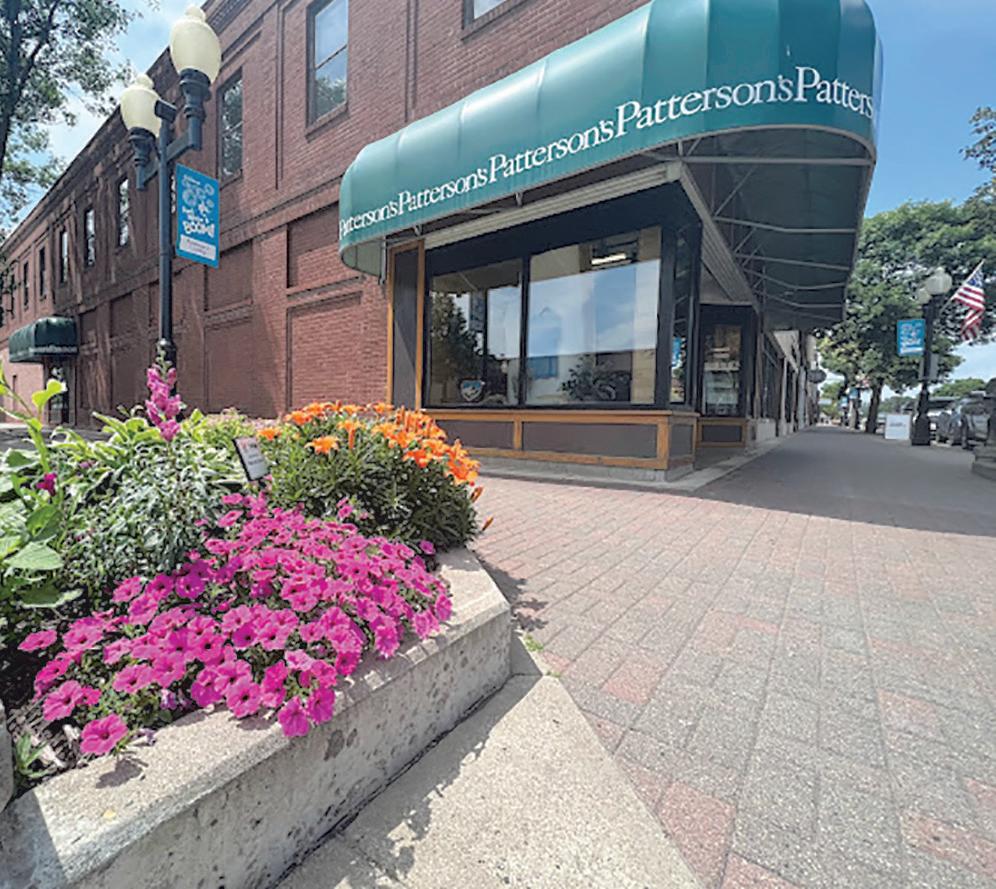
Long before the streets had names, the southwest corner of Third Street and Beltrami Avenue was the site of George Carson’s Pioneer Store, but it was a wooden building that burned to the ground in 1916. John A. Dalton had established the original Dalton Hotel in the building in 1906, so he already had a history on that corner. Despite bad luck with several fires and the worst one in December 1916, he was persistent about owning a hotel on the site.
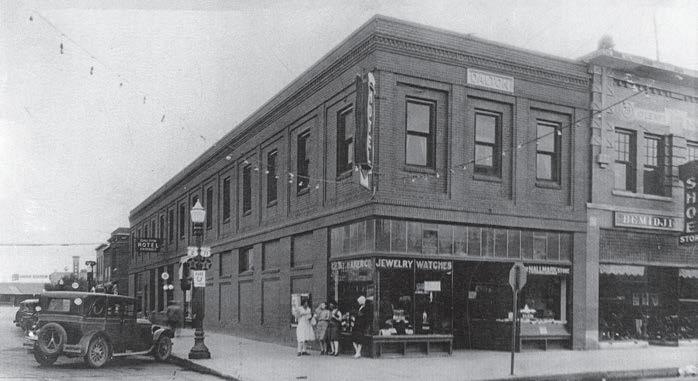
Dalton’s new structure occupied the full length of the lot, was two stories high and had a full basement. It was built of handsome dark red brick and paneled on the Beltrami Avenue side.
The building still has the name “Dalton” on a stone slab high on the north side.
The front portion of the first floor was arranged specifically for occupancy by George T. Baker’s jewelry and music store.
A large plate glass window set in copper faced the street.
The lobby for the hotel was on the main floor
on the south end of the building at 215 Beltrami Avenue. Twenty-five rooms were on the second floor, each room having a window, while the hall had a window at each end.
Another fire broke out in the middle of the night on Nov. 1, 1920.
Patrons of the Dalton Hotel made their exit from the second floor by climbing out the windows since the burning stairway blocked the only means of passage to the exit below. The quick work of the fire department held the fire down, and the loss was not as heavy as it might have been under more drastic circumstances.
If the walls could talk, they might answer the question of how Emma Davids died in 1906 –suicide or murder. They might describe how the proprietor, John Dalton,
had knitted seven sweaters for the Red Cross during World War I.
The walls might also give the reader details about Dalton’s defense in 1918 when he was found guilty of having assaulted a waiter. Dalton said he discovered that his

employee was bootlegging on the side at night, and when Dalton challenged him, there was a bit of a fisticuff incident. Dalton was found guilty of assault, but was he justified in his action?
The Bemidji Local of the Cooks’ and Waiters’


Union decided upon an eight-hour working day as the basis for wages, with time and a half for anything over eight hours in April 1920. A few heated discussions may have followed. Rather than adopt the new eight-hour schedule, Dalton decided to close the restaurant and promptly stacked the tables and chairs in a corner of the dining room.
John A. Dalton died in January 1922, but the hotel continued for another 50 years. Adaptations were made.
took place in the summer of 1947. The lobby of the Dalton Hotel was shortened, and a new entrance was constructed to enable the guests to reach the second story of the building. This gave Patterson an additional 30 feet for the store. A balcony office was erected at the rear of the store, and modern dressing rooms were added. The new space in the basement was remodeled for a stock room.
Many men rented their tuxedos for prom and weddings from Patterson’s. Pendelton shirts were another staple of the store and many families relied on buying the husband or father a new Pendleton shirt for Christmas.
When Abe’s son, Ron Patterson, returned from the Korean War, he went to work in his father’s clothing store. As Abe worked less and less, Ron and his wife Ralyhe took over Patterson’s. Together, the two continued making the men’s clothing store a staple of the downtown shopping area.
Rooms were changed, but residents continued to live on the second floor as was common in downtown Bemidji.
Elizabeth Dalton sold the building to Abe Patterson for his men’s clothing store in January 1934. Major remodeling

Ron and Ralyhe’s son, Steve, came back to Bemidji in 1977, and he began working at the store with his wife, Sally – just like his dad and grandfather before him. In April 2018, Steve and Sally’s daughter, Molly, and her husband Jeff Miller took over the business, becoming the fourth generation to run Patterson’s Clothing in downtown Bemidji, and they remain the current owners to this day.
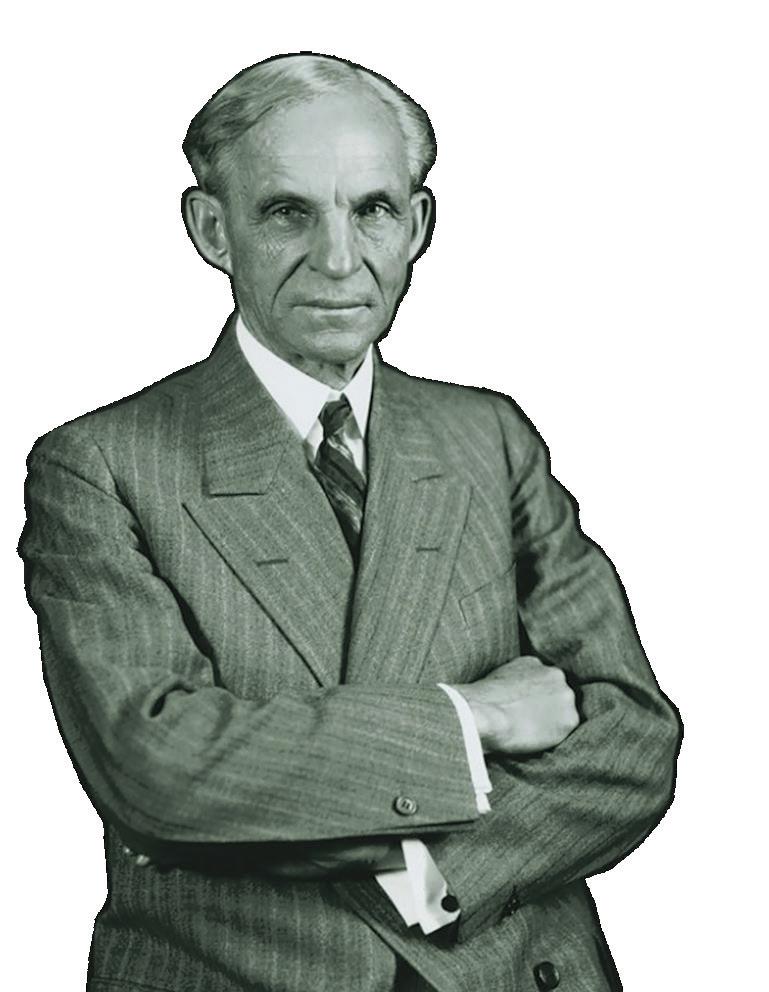
4 | ANNUAL REPORT | Saturday, auguSt 26, 2023 | The Bemidji Pioneer BemidjiPioneer.com 200 3rd Street NW | Bemidji, MN 218.751.4743 PATTERSON’S BRANDS YOU KNOW AND TRUST: Kuhl, Patagonia, The North Face, Smartwool, prAna, 7 Diamonds, Johnnie-O, SAXX, Darn Tough, Mission Belt, Secrid, NOCS, and many more! MEN’S SUITS & SPORT COATS WITH IN-HOUSE TAILORING MEN’S TUXEDO & SUIT RENTALS MEN’S & WOMEN’S SPORTSWEAR MEN’S & WOMEN’S MERINO WOOL SOCKS MEN’S DRESS & CASUAL SHOES MEN’S BIG & TALL Patterson’s Clothing Since 1930 Apparel is our strong suit.
Celebrating 59 Years in Bemidji Coming together is a beginning; keeping together is progress; working together is success. Henry Ford -1926
Annalise Braught / Bemidji Pioneer Patterson’s Clothing has been located in the former Dalton Hotel since 1934.
Courtesy / Beltrami County Historical Society
John A. Dalton built his two-story hotel in 1918. The front portion of the first floor housed George T. Baker’s jewelry and music store.
From a corner hardware store to a corner boutique
By Christian Babcock
The Bemidji Pioneer
A lot of hard work goes into maintaining a business.
The same goes for any building that contains said business. And over the past 100 years, the current location of Ally’s Corner at Fourth Street and Minnesota Avenue has undergone significant change quite a few times over.
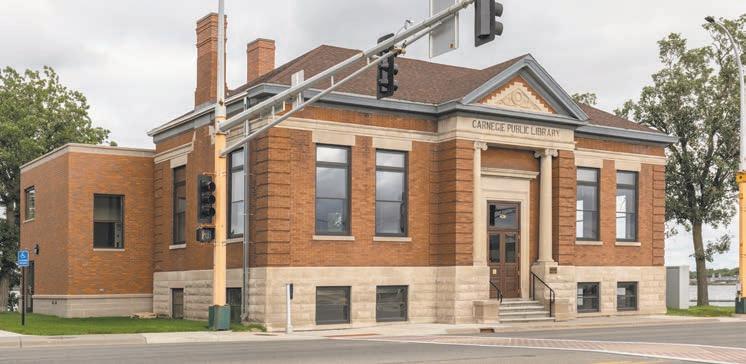
Doors that faced Minnesota Avenue gave way to the current setup that faces Fourth Street, and through the years, a rough-and-tumble hardware store gave way to its current use as a boutique shop.

Before prohibition, Frank Silversack owned the City Hall Saloon in a wooden two-story building on this corner. After several legal hassles and an attempt by his disgruntled wife to burn the saloon down, he traded the saloon for a farm in Clearwater County. The Haffner family took over the saloon, but all saloon business was shut down in 1915 in Bemidji.
Charles W. Vandersluis was a traveling salesman, but after 15 years of moving around, he decided one morning that he had traveled enough. He wanted to settle down and own a hardware store.
When he got the opportunity to buy the former saloon building, he remodeled and opened March 30, 1915. It faced Minnesota Avenue and featured a 25-foot front and extended back, full of merchandise for the initial start of business.
Soon, the store became too small, and Vandersluis purchased the adjoining lot with the intention of erecting a
larger building. In 1919, W.Z. Robinson became a business partner, and the two remained in partnership for eight years.
In 1921, the new building was finished. It was a two-story brick structure with a 50-foot front on Minnesota Avenue with “Bemidji Hardware” engraved into the building. It also had a full basement. The old construction was moved back and relocated to face Fourth Street. Charles and Lela Vandersluis lived in a comfortable residence on the second story of the hardware building.
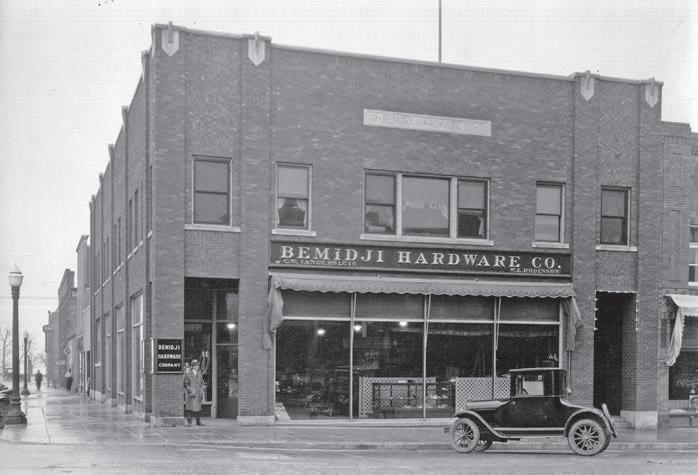
Adversity struck in 1927 when a fire burned out the store. The shell was intact. Vandersluis bought out Robinson’s share of the building, demolished the second story, and completely rebuilt the interior of the main floor.
In 1938, Charles
Vandersluis decided he’d had enough of the hardware business and turned over the business to his second son Angus and to Frank Markus, who had been working at the store for 13 years.
Charles wanted to look after his other business and political inter-
ests. Arthur Vandersluis bought out Markus’ interest in 1952, and the two brothers, Angus and Art, continued the business until Angus died in 1967. Art carried on until he sold to Chet Swedmark on Dec. 2, 1968. Paul Swedmark and his sons had been in
the hardware business in Bemidji since 1937. A devastating fire in 1966 forced Chet Swedmark to set up temporarily in the VFW building. With Vandersluis willing to sell and Chet Swedmark’s need for a new location, the sale worked for both of them. Over 2,000 were said to have visited Swedmark Hardware during its grand opening. A new era began with this purchase by husband and wife team Chet and Naomi Swedmark.

“I remember it being kind of exciting,” said Ann (Swedmark) Sand, the couple’s daughter, who graduated from Bemidji High School in 1969. “Now they had

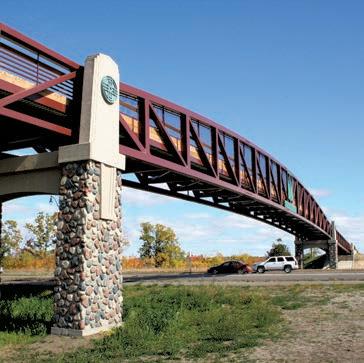
few different bars, the structure stands today as Ally’s Corner. The boutique shop features a variety of unique items, including repurposed furniture, vintage treasures, handcrafted jewelry, indie-dyed yarn and items featured by local artists.
The building also features The Hub, a space that can be rented for birthday parties for children, showers, meetings, team-building events and more.


Ally’s Corner was formed this year as a merger of Twine & Gable and Junkin’ Treasures. Junkin’ Treasures, operated by Kelly Speck, had occupied the current building since 2019. Twine & Gable, operated by Angie Behr, moved from its previous location on Beltrami Avenue south of Third Street.
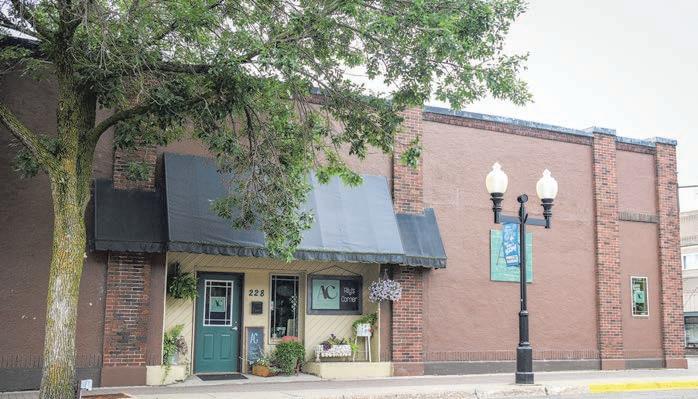
“When Angie and I merged, we had lots of ideas,” Speck said. “And one of them was (The Hub). She does knitting and jewelry-making classes and generally just a bunch of different classes. I’ve done painting classes. So we wanted a classroom, and our landlord let us take over this area.”
this bigger, much nicer store. It still had that feel of an old-time hardware store, but they had really upgraded it with new lighting and new fixtures. Prior to that, it was a pretty sleepy little store.”
After some time as a bargain center and a
The expanded footprint has enabled Ally’s Corner to diversify its offerings, crafting a new chapter in a space with a rich history. Remnants of the hardware store include a belt rack and a since-sealed staircase running down to a large basement underneath.
Behr highlighted the exposed brick as another rustic indicator of the character and legacy of the century-old building, one that Ally’s Corner will continue into the future.
BemidjiPioneer.com The Bemidji Pioneer | Saturday, auguSt 26, 2023 | ANNUAL REPORT | 5 Extraordinary ExperienceSomething 218.444.1859 | 3155thStreetNW | Bemidji | Widseth.com
Courtesy / Beltrami County Historical Society
Charles Vandersluis turned a former saloon building into the Bemidji Hardware store in 1915. This 1922 photo shows the store facing Minnesota Avenue.
Madelyn Haasken / Bemidji Pioneer
Ally’s Corner was formed this year as a merger of Twine & Gable and Junkin’ Treasures.
Preserving a piece of downtown history
 By Madelyn Haasken
The Bemidji Pioneer
By Madelyn Haasken
The Bemidji Pioneer

When a downtown area has as rich of a history as Bemidji’s does, certain historical aspects are often preserved for decades. Such is the case for 218 Clothing + Gift, a shop housed in a small building with a rich history that has stood the test of time.

On Nov. 17, 1897, the Bank of Bemidji opened its doors in a small white wooden building on the corner of Third Street and Minnesota Avenue in the heart of downtown Bemidji by owners R.E. Davis and William H. Taber.

On its opening day, five people opened checking accounts at the bank totaling $910, as well as 18 loans totaling $1,088.
The bank quickly outgrew its initial space and on Nov. 27, 1903, the bank moved into a brand new block on the northeast corner of Third and Minnesota that included a basement. Barbers seemed to like the immediate area, and Paul Foucault moved into the new basement. In 1906, Foucault did some remodeling to the shop and added a bathroom.
As was the case with most other buildings on Third Street, the bank also had offices upstairs and had lawyers, realtors and others as tenants. In 1904, both Dr. Henderson and Dr. Tuomy had offices upstairs.
The bank again needed to expand, and an extensive remodeling job took place in 1913, as reported in a Bemidji Pioneer article at the time.
“During the coming summer improvements
to the amount of about $15,000 will be made upon the (bank) building of this city,” the story read. “Plans and specifications for the remod-
























During the early 1930s, Al Amundsen moved downstairs into the basement of the building where he operated his business, Al’s Bar-
lan formed a partnership in February 1941 and set up in Walters’ place of business. By 1946, Fritz Hanson replaced Walters as Morlan’s partner
a barbershop by Harvey Brundage in the mid1950s.
During World War I, the bank’s total assets hit the $1 million mark. The bank continued to grow slowly, hindered by the depression during the 1930s.

In 1931, the Bank of Bemidji underwent another significant change when it was renamed to First National Bank Bemidji after being purchased by Andrew and Charles Warfield.
About 14 years later in 1945, Nick and Rudy Welle along with Elgin Phillips and Les Hoganson acquired the bank from the Warfields.

By that year, assets had passed the $5 million mark, quintupling since the 1910s. In 1948 the bank went through a complete remodel.
unable to accommodate the bank’s growth. Construction began for a new bank facility on the corner of Fifth Street and Minnesota Avenue and was completed in 1964.
After 67 years of First National Bank being housed within the building, it was finally vacant and ready for a new business to move in. According to property manager Dan Christianson, after the bank moved locations the Welle family sold the space to Jack Naastad, who operated a Kirby Vacuum center in the space for about 21 years.
In 1985, Jack’s brother Knute took over the space, running a vacuum and sewing shop in the space until about 2003.
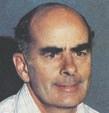
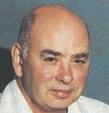
In 2004, Phil and Angie Bremer opened a chiropractic office in the space.








eling have been received by the directors. The front will be of white stone and the inside will be entirely remodeled. An addition of 30 feet will be built in the rear.”
The upstairs continued to have long-term tenants. Dr. Dannenberg, chiropractor, was upstairs in 1920 along with lawyer and Judge Marshall Spooner, and architect Charles B. Funk. In the 1940s, it housed two physicians, Drs. Jacobson and Haller. It also housed the Waite Studio, a photography studio, which partnered with the Northland Times to sponsor a ”beautiful baby” contest in 1946.
ber Shop. It became the location for “Red” Walters in 1937. “Red” Walters and Cliff Mor-
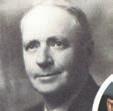
in what they called the First National Bank Barber Shop. The basement continued to be used as

With assets breezing past the $7 million
The shop on the corner of Third Street and Minnesota Avenue found long-term residents in 2014 when sisters-inlaw Jen and Jennifer Pomp opened 218 Home + Gift (now 218 Clothing + Gift) at the former home of First National Bank Bemidji at 223 Third Street.

Named after northern Minnesota’s area code, 218 is now a one-stopshop for tourists and locals alike to stock up on Bemidji and Minnesota-themed apparel and gifts.
Despite all the changes in businesses operating in the space over the years, the front of the building still displays the “First National Bank” lettering to this day, preserving an important piece of downtown Bem-

6 | ANNUAL REPORT | Saturday, auguSt 26, 2023 | The Bemidji Pioneer BemidjiPioneer.com entire life,First NationalBank Bemidjiisreadytohelpyou reachyourf inancial goals. 218-751-2430 fnbbemidji.com oc o Localpeople, Wh eth er yo u’re an ew neighb or or yo u’ve be en he re yo ur entire life,First NationalBank Bemidjiisreadytohelpyou reachyourf inancial goals. 218-751-2430 fnbbemidji.com d re a m s Local people , local dreams Localpeople, local PROUD to be part of BEMIDJI’S SUCCESS • • Established 1920 By The Batchelder Family Bill Batchelder, 4th Generation Owner I.P. Batchelder Founder - 1st Generation I.J. Batchelder 3rd Generation I.H. Batchelder 2nd Generation Ronald Batchelder 3rd Generation ® IT’S YOUR HEALTH... WE CAN HELP The only LOCALLY OWNED and MANAGED PHARMACY in Bemidji, meaning you get the care you deserve. You choose who fills your prescription. Our staff can help you make the change. Visit our website www.iversoncornerdrug.com 408 Minnesota Ave NW Bemidji, MN 218-444-3000
Maggi Fellerman / Bemidji Pioneer
The former First National Bank Bemidji building on the northeast corner of Third Street and Minnesota Avenue now houses 218 Clothing + Gift.
Courtesy / Beltrami County Historical Society
An early parade passes by the First National Bank Bemidji building.
From saloon to municipal liquor store to Gene’s Tap and Bar 209
By Sue Bruns
Special to the Pioneer
By Davey Mills’ reckoning, the 209 Minnesota Ave. NW address was a saloon as early as 1898. Mills first co-owned Bar 209 with Jason LaValley in the building in 2006, then bought his cousin out, did a major remodel, and ran it until February 2011 when he sold it to Derek and Brett Leach. The Leach Brothers (Brothers Group LLC) ran Bar 209 at its original location until opening their new bar in the old American Legion building at 219 Minnesota Ave. NW in 2018. After the business relocated, they kept the Bar 209 name and sold the old building to Mike Wiltse. Under “Saloons,” the 1904 Bemidji City Directory lists the Peerless Buffet at 209 Minnesota. Bemidji had an overabundance of saloons in its early years, with a total of 27 saloons listed in a four-block area of downtown Bemidji and four listings in Nymore. By some accounts, that number almost doubled in the years prior to Prohibition.
The Buffet was shut down by Sheriff Thomas Bailey in 1905 but reopened and continued its ups and downs under a number of different proprietors. The front of the building sustained major fire damage when the Merchants Hotel across the street burned down in 1907. When prohibition came to Bemidji in 1914, saloons were shut down for about 20 years. A number of businesses
came and went at 209, including restaurants, a pool hall and a soft drink distributorship. (Some were shut down for breaking liquor laws.)
When Prohibition ended in 1933, there were new licensing rules and restrictions and a new phenomenon: municipal or city-owned establishments. The city rented the building at 209 Minnesota and opened City Liquor Store No. 2 in the spring of 1934. The building had at least three apartments upstairs that had been listed as a hotel in the early days.
Linda Lemmer, who worked at Muni No. 1 on Third Street, which had both on-sale and offsale liquor, says No. 2 did not sell packaged or offsale liquor; only on-sale drinks. The law changed in 1970, and municipal stores were no longer allowed to sell drinks on-site – only off-sale; on-sale drinks were sold exclusively in privately owned establishments.
Eugene “Gene”

Schwartz bought the building from Sam Meyerson in 1968, according to his daughter Debbie Schwartz Little, and ran Gene’s Place until he sold it to Jim Hamilton in 1989. Gene’s wife Cleo worked days at the bar and Gene worked nights.

“He loved owning the bar and he loved people,” Debbie said.
A few years after purchasing the bar, Gene added the back room and occasionally had live bands. A walk-in cooler was also added and a mug freezer for frosty
mugs. Debbie says Gene’s was the first privately owned bar in Minnesota to get pull tabs, and Gene sold them to benefit the Bemidji Figure Skating Club. His stepsons Scott,
ley fixed up as much as they could do cheaply, and business improved, but then the Minnesota Clean Indoor Air Act (MCIAA) and the Freedom to Breathe (FTB)

up with the actual floor.
Smoke and soot coated the cement and brick walls that had probably saved the building from being destroyed by fire over a hundred years ago
bar came in now. They ordered food, had a drink or two, and left – not like some of the old regulars who sat at the bar most of the day downing whiskey waters. Custom brews were becoming popular and Bar 209 had 18 taps. People came in for sampling.
Bar 209’s “Kegs & Eggs” breakfast for BSU homecoming became an annual event offering all-you-can-eat eggs, bacon, hashbrowns (and beer) for $10.
“The first year we went through three kegs; the second year, six kegs,” Mills added. “The third year, the line stretched around the block. I was cooking eggs like crazy. Full pitchers were being sent out and empty ones were handed back nonstop. We went through 12 kegs in four hours.”
Joe, and Jeff Mayer also worked at Gene’s. Hamilton bought the bar from Schwartz and kept the original name. Between 2000 and 2002, it was Smiley’s Bar & Grill. Mike Nickerson bought it from Hamilton and sold it to Jason LaValley and Tony Newby, who named it Bar 209. Davey Mills, LaValley’s cousin, bought out Newby and used one of the apartments upstairs for his lumber business (Mills Hardwoods) office.
Mills and LaVal -













amendment were passed and set to go into effect on Oct. 1, 2007. Mills bought out LaValley and closed Bar 209 to do a major remodel, relocating the bathrooms to the back, repairing and replacing floors, building a new bar and doing major work on the walls, electrical and plumbing.
“There were four inches of layers of flooring — carpet over linoleum,” Mills said.

When they tore it all up, the entry door had to be lowered to meet
when other buildings in the area burned. One wall had to be knocked out by sledgehammers; a back wall, blackened by soot, was sandblasted to clean up the Chicago brick. Mills chiseled stucco off another wall.
After three months, the bar reopened.
“When we opened the doors, it was like someone hit a light switch,” Mills said. “It was a different clientele.”
With the smoking ban, people who had never before come into the


Mills sold Bar 209 to the Leach brothers in February 2011. They operated the 2,100-square-foot bar until they moved to the former and much larger Legion building, where they reopened Bar 209 and launched Red Stu Breakfast Bar in June 2018. They continued the Kegs & Eggs homecoming event until 2020 when Covid shut things down, but they plan to bring it back this year at their current location. After sitting empty for five years, the building will have a new look in the coming months when Mike Wiltse moves his business, Your Mom’s Tattoo Atelier, to 209 Minnesota from its current location in the Elks Building at 110 Fourth St. NW.

BemidjiPioneer.com The Bemidji Pioneer | Saturday, auguSt 26, 2023 | ANNUAL REPORT | 7 H HWe Want Your Vehicle H H H We Want Your Vehicle H H H We Want Your VehicleH H H We Want Your Vehicle H H HWe Want Your VehicleH H HWe Want Your Vehicle H H H H H We Want Your Vehicle H H H We Want Your Vehicle H H H We Want Your Vehicle H H H We Want Your Vehicle H H H We Want Your Vehicle H H H H H H We Want Your Vehicle H H H We Want Your Vehicle H H H We Want Your Vehicle H H H We Want Your Vehicle H H H We Want Your Vehicle H H H H HWe Want Your Vehicle H H H We Want Your Vehicle H H H We Want Your VehicleH H H We Want Your Vehicle H H HWe Want Your Vehicle H H HWe Want Your Vehicle www.hondaofbemidji.com 218-444-4663 • 755 Paul Bunyan Dr NW, Bemidji www.bemidjichrysler.com 218-751-8006 • 755 Paul Bunyan Dr NW, Bemidji BEMIDJI CHRYSLER CENTER “THANKS TO YOU... We’re celebrating again!” Tom Westermann Brady Jones Kyle Trefethren Tristen Rosby Mike Zattera Check Us Out Online At: bemidjichrysler.com & hondaofbemidji.com WE WANT YOUR HELP TO CELEBRATE AGAIN! Vote for us for: - Best Car Dealership - Best Dealership Service Department - Best Salesperson - Best Oil change bemidjipioneer.news/bestof2023 John Webb
Matt Carlson
Annalise Braught / Bemidji Pioneer
The old home of Bar 209 is located at 209 Minnesota Ave. NW.
From pharmacy and soda fountain to radio broadcasts
By Sue Bruns
Special to the Pioneer
When John “Jack” E. Quistgard, a young pharmacist from Warren, Minn., wanted to buy Bemidji’s Glass Block Drugstore in 1950, none of the local banks would give him a loan.

He was new to the community, the building was just a few years old, but, they asked him how could he make a go of it when the first two owners hadn’t been able to.

He finally was approved through Northern Drug of Duluth.
Jack bought the drugstore, which had been built at 500 Beltrami Ave. NW in 1946 by Rod and Alice Johnson. The Johnsons had run the drugstore across the street at 424 Beltrami in Morris Kaplan’s Glass Block building. Quistgard’s Glass Block Drug stocked Rexall products, Hallmark cards, Russell Stover candies (and later Fanny Farmer) and a variety of other products. The store also had a luncheonette and a soda fountain.

The drugstore was conveniently located for patient prescriptions, with Drs. John Hildebrand and Jason Hartje in offices above the drugstore and nine more doctors at the Bemidji Clinic just down the block at Sixth and Beltrami. At one point, Jack employed as many as five pharmacists.
Jon Quistgaard, Jack’s son, recalls moving freight at the store as a kid before getting his first “real job” as a dishwasher for the fountain. He remembers Minnesota Vikings — at Bemidji State for spring training in the early 1960s —
coming to the store: Jim Marshall, to buy camera film, and Carl Eller, to order root beer floats from the fountain.
Cecelia McKeig worked at the fountain between 1955 and 1960. She remembers delicious chocolate malts and cherry phosphates.
“We were busy most of the day and always had a rush of business after the movies let out at 9 p.m.,” she said. The soda fountain, originally on the main floor, was moved downstairs around 1961.
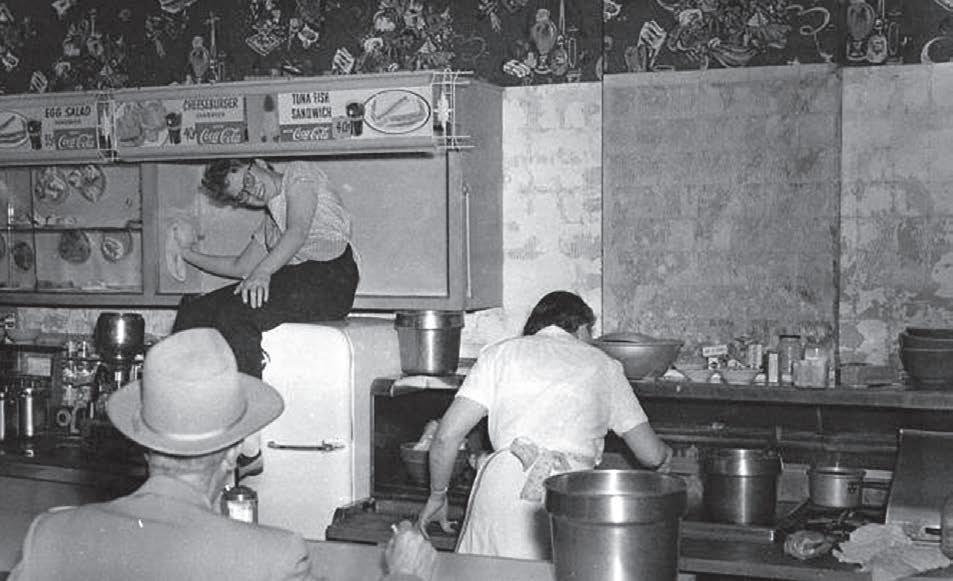
Jon says his dad’s “Coffee Klutch,” an eclectic group of busi-
nessmen, met on weekdays for coffee at the fountain. The “Klutch” included Shelley McRae, Judge James Preece, Bud Larson, Bert Gaetke, Fran Saeger, Dr. Hildebrand, Superintendent of Schools J.W. Smith, Bob Wilson, who had Wilson’s clothing, Sheriff John Cahill, Bill Schwartz from the funeral home, and others.
At the end of each coffee gathering, Jon said, “They played a game called High-Low to determine who would buy coffee for everyone that day.”

Jon also remembers a crazy night in April 1961
when the Hartz store in the first Glass Block building across the street burned down. Jon and his brother Skip were on top of their dad’s store, spraying water on the roof, hoping to deter fire. After Jack sold the business in 1973 to Vern Schanilec, it continued to operate as a drugstore through 1981.
Paul Bunyan Broadcasting
The most interesting things about Glass Block Drug were the people who worked there or who came in; the most memorable things about Paul Bunyan Broadcasting’s presence in the building are the sounds that come
out: Sports broadcasts, music, news, and programs from legendary voices of Bemidji.

In October 1946, KBUN Radio started up in Bemidji, operating at 419½ Beltrami, 511½ Beltrami, and finally 502½ Beltrami, above the drugstore. As the company expanded, added stations and became Paul Bunyan Broadcasting, it filled the entire upstairs. Among the early legendary voices and reporting were Ned Goodwin, Cameron McMahon and Jim Carrington. Goodwin was KBUN’s general manager and later vice president of PBB. His popular “Musical Memories” program ran for 23 years. He built KBHP-FM in 1972. Carrington came aboard in 1954 as a sportscaster and disc jockey. He stayed just four years before moving to the Bemidji Pioneer where he reported news and sports for 52 years. Cameron McMahon worked for KBUN for
RADIO: Page 9
8 | ANNUAL REPORT | Saturday, auguSt 26, 2023 | The Bemidji Pioneer BemidjiPioneer.com youmight notknow we have life,home, autoandbusiness insurance.now youdo. simplehumansense youmight notknow we have life,home, autoandbusiness insurance.now youdo. simplehumansense 307 Third Street, Bemidji | 751-0821 www.northwayinsurance.com 172 Spirit Ave Bemidji 218-444-4328 • naylorhvac.com Building New or Remodeling? Call us for Free Consultation for a New High Efficient Heating & Cooling System
Madelyn Haasken / Bemidji Pioneer
Paul Bunyan Broadcasting operated on the second floor above the drugstore until 1984 when it moved to the newly remodeled main floor
Courtesy / Beltrami County Historical Society
Judy Dvorak, one of many young women who worked at Glass Bock Rexall Drugstore’s soda fountain, is shown cleaning above the refrigerator.
Northern Surplus supersedes auto stores in downtown building
By Jared Rubado The Bemidji

Pioneer
Near the edge of Bemidji’s downtown area there is a building that housed a few of the town’s most recognizable businesses.
The brick structure on the northeast corner of Third Street and America Avenue currently hosts Northern Surplus, but the corner has been in regular use since shortly after the town was platted.
Several timber companies used the lots before the Bemidji Timber Company occupied the corner at 325 Third Street from
1928 to 1938. Two businesses shared the corner in 1942. Earl Bucklen operated his plumbing business there. Robert and Edward Swenson conducted the Swenson Electric company at the same location.
Bucklen sold the building to Harry Pihl in October 1944. Pihl had been renting part of the building for a machine shop.
Pihl and H.J. Strowbridge had previously partnered in the Bemidji Auto Parts Co. down the block at 305-307 Third Street and secured one of the first defense projects


in Bemidji in February 1942.
In the fall of 1945, Pihl replaced the plumbing shop with a new construction which he added to the machine shop at the rear of the lot. The building was all blonde brick construction. Bemidji Auto Parts moved into the new building in June 1946.

Pihl operated the parts business for more than four decades. Pihl’s fingerprints touched many local businesses, including Pihl Manufacturing Co., Bemidji Broadcasting Co., Bemidji Aviation Inc., and the North Cen-


tral Garage Door Co.
Although Harry Pihl had retired, and died in 1989, and his son Harry “Fred” Pihl had retired, and died in 1994, Bemidji Auto Parts was still listed in 1995 at 325 Third Street as well as an entrance from 310 America Ave. William Bruers had been the manager for some years.
Northern Surplus moved to the location in 2000.
Northern Surplus
RADIO
From Page 8
nearly two decades. She also served as Bemidji’s first city councilwoman from 1971 to 1978. Todd Haugen, who joined PBB in 1979, says Carrington credited McMahon with starting (and naming) KBUN’s long-running Chatabout program in 1956. After leaving KBUN, she frequently called into the program when Haugen and Mardy Karger were doing the show.
“She always had a curious way of speaking,” Haugen said. “She was just eccentric and fun to hear from.”
When Haugen started at KBUN, the entire operation was upstairs and the drugstore was still open. He says Ned Goodman made a deal to build new studios on the ground floor where the store had been.
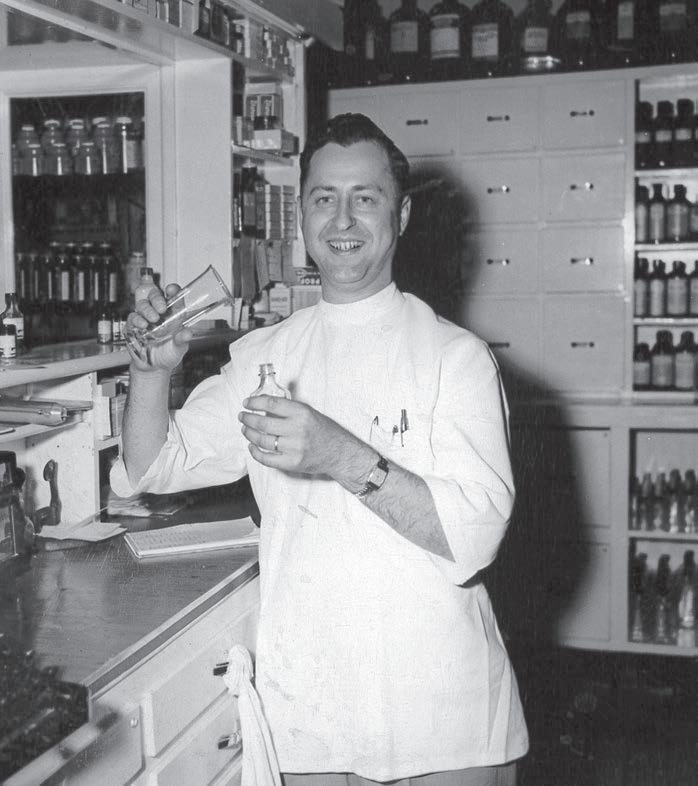
Construction of studios, hallways and an office area took several months to complete, and production moved downstairs into the new studios in the summer of 1984. Today Hub-
was started in Bemidji by Donald Thoreson and Alden Kittleson in the Troppman Building. Pete and Alice Dreyer purchased the Northern Surplus Store in Bemidji in the 1970s. Their son, Bruce Dreyer, now operates the business.

“I’ve been selling leather since 1976,”
Dreyer explained. “At one time, I had the only leather store in the state of Minnesota. I carry a large selection of (Indig-
bard Broadcasting owns and occupies the entire building.
Mardy Karger, news director for most of his 40 years with PBB, says everything about radio changed during his tenure. He remembers when Minnesota Twins’ broadcasts used to cut out later in the game because FCC regulations required stations to cut their wattage when the sun went down. In the studio, technology evolved dramatically.
Kev Jackson, the current long-timer at PBB, started in 1987 after the radio station had moved downstairs to the main floor. Like Karger, he recalls equipment that evolved from tapes to 8-tracks, all the way to today’s clean, compact computer-controlled soundboards.
When he started, Jackson says, one entire studio was dedicated to a huge automation system for five spinning cylinders, reel-to-reel tapes and record players. Broadcasters often spend time outside the studio, too.
“You’ve got to do a lot of dog and pony show stuff — play donkey
enous) regalia. I think Northern Surplus is very important to the community. I’m locally owned and have had a good rapport with our customers.”
From plumbing to leather, the historic brick building on the corner of Third and America has served as a staple of some of Bemidji’s most prominent ventures.
basketball, milk steers in a muddy pasture, crazy things like that,” Karger said. “Then try to get the news ready for the next day. My goal was (still) to be recognized as a journalist.”
Karger retired in 2015. Haugen retired in 2022 after 43 years. He brought the morning traffic report to KBUN.
“It started as a crazy idea to do something old style, something a bit absurd but with a storyline,” he said. His character Olaf Olafson gave off-beat fictitious morning updates on the traffic in Bemidji. The cast of characters grew to include Olaf’s fisherman sidekick, Duffy, and tough guy helicopter pilot, Flint Westwood. Some listeners found it too silly, Haugen says, but most saw it for the local humor it was.
Jackson added that the most rewarding part of the job is being a positive wavelength for the community. He came to the station not long before their first Radiothon to End Child Abuse; in December, the station will host the 35th Annual Radiothon.
BemidjiPioneer.com The Bemidji Pioneer | Saturday, auguSt 26, 2023 | ANNUAL REPORT | 9 Quality & Convenience for Clients/Respect & Opportunity for Associates We offer all-encompassing employment services to Northern Minnesota. Job Seekers: Apply in person or on-line. Let us give you the opportunity to develop your career. We have a wide variety of jobs in Manufacturing, Clerical/Admin/Acct, IT, Laborers, Construction and more. Employers: Call us today. We find the right people to empower your business. www.alwaystherestaffing.com | 218.444.6533 2522 Hannah Ave NW – Bemidji, MN 56601 A Great Place for a Great Burger! If our walls could talk, they would tell of... • Gathering place for friends • Volleyball games • Fundraiser held for the 2006 Olympic Curling teams of
and
Johnson • Joe Motzko bringing the Stanley Cup for an evening of celebration in 2007 • Other numerous events • Starting place for several marriages! • Many other memories... OPEN 11AM MONDAY - SATURDAY 142 ANNE STREET NW, BEMIDJI, MN • 218-444-SLIM
Pete Fenson
Cassie
Maggi Fellerman / Bemidji Pioneer Northern Surplus has been located at 325 Third St. NW since 2000. Northern Surplus was started in Bemidji by Donald Thoreson and Alden Kittleson in the Troppman Building. Pete and Alice Dreyer purchased the business in the 1970s. Their son, Bruce Dreyer, now operates the store.
Contributed / Beltrami County Historical Society Harry Pihl operated Bemidji Auto Parts for more than four decades at the northeast corner of Third Street and America Avenue.
Contributed / Jon Quistgaard Jack Quistgard operated the Glass Block Rexall Drug Store from 1950 to 1973.
From Turkish baths to modern-day wellness spa
By Cecelia McKeig Special
to the Pioneer
From 1907 to 1909, the brick building at 423 Beltrami Ave. housed Turkish baths. Today, it houses an elegantly peaceful business called the Siam Wellness and Massage Spa. The building is probably best known as the site of the Bemidji Pioneer newspaper for 50 years, but it has had a varied history and was constructed originally for use as a meeting hall.
One of the oldest buildings in Bemidji, the two-story brick building on the southwest corner of Fifth Street and Beltrami Avenue was constructed in 1905 by the Bemidji Lodge of Freemasons.
The committee was very proud of the construction’s modern conveniences, which included steam heat, electric lights and waterworks. The building was completed at a cost of $8,000. The second story was used as a lodge room and the first floor was rented out to the Crookston Lumber Company as a reading room.
In March 1906, the reading room was used for the examination of 12 prospective mail carriers. The tests started in the morning and continued until late in the afternoon. Those of Bemidji who tried for places as carriers were Sgt. Adam E. Otto, Harry Geil, Hollie Barrett, J.C. Cobb, Lee Heffron, Aakeberg, W.H. Elletson, George Harris and Arthur Gould.
The Knights of Pythias held many of their meetings and events at Castle Hall at the Masonic Block. They had a splendid public installation, a banquet and ball on Jan. 1, 1907.
The meeting started at the Masonic Block, then adjourned to the Markham Hotel for a banquet and then the floor of the lodge room at the Masonic Block was cleared and dancing continued until the wee hours. Cards and other games were set up on the first floor for those who chose not to participate in the dancing.
Turkish bath rooms were located in the basement rooms of the Masonic Block in 1907. D.C. Smyth was the proprietor, and Professor J.G. Philips was in charge. In January 1908,
Miss Blanche Paddock, professional masseuse, worked at the bath parlors. Plain showers and Turkish baths, hairdressing and manicuring were offered on Thursday afternoon of each week and times were set aside for Ladies’ Day from 2 until 10 p.m.
In July 1908, Professor W.B. Ford was again in charge of the Turkish bath parlors in the Masonic building and announced that he would be pleased to serve his old-time friends and patrons.
In 1909, these rooms had Mr. and Mrs. Alvin Frost as attendants. They advertised tub and shower baths, ladies’ shampoo and hairdressing day and night.

Many fraternal organizations held their meetings in the Masonic Hall. Retail clerks of the city met in the Crookston Reading Room and organized a new association in September 1913.
The Fourth Minnesota Infantry that was stationed in Bemidji during World War I was first quartered in the Crookston Reading Room and later shifted to a hotel. The unit was demobilized in December 1918.
On July 3, 1920, the Bemidji Daily Pioneer dismantled its large paper press so it could be moved into this building. It was also the home of the weekly Sentinel until this weekly publication was discontinued in 1962.

After the high school was destroyed by fire
in January 1921, classes were held in the Masonic Hall and the Crookston Reading Room. The manual training classes for the senior high school, which included woodworking and similar hands-on training, were held in the Crookston reading rooms in the fall of 1921.
The Masonic Lodge likely continued to meet there until their new building was completed in 1923 on Bemidji Avenue.
Phil Wattles, a paperboy in the 1950s, recalled, “When I think of the old Bemidji Pioneer building, my first thought is of the open stairwell on the north side of the building and the steps leading down to the noisy room where

getting hurt. There were big doors just to the west of the steps which were left open in the summer. I’m sure it got very warm in that room with all the machinery running for hours. Passersby often craned their necks to see what was happening inside the building.”
One reader, Ken Edd, wrote on Facebook:
“My brother, Jon, had a friend whose mother was a Linotype operator at the Pioneer in the ‘50s. He took us to visit her, and I remember being awed by the complexity of the machine. Gears and levers and switches all run by his friend’s mom.”
newspaper stalwarts like John Ainley, Fred Bahr, Cliff Morlan, and Marie Mossefin. The Pioneer moved its printing presses to the Industrial Park in 1970. The business offices, however, did not move out of this building until 1972.
Jack Quistgard of 2-Q’s, Inc. bought the old Pioneer building. It underwent major remodeling, and scaffolding surrounded the building in the spring of 1973.


we gathered every day to pick up the papers for our paper routes.
“The steps were fairly steep, and the barrier around them consisted only of a couple of iron railings. Despite that, I don’t remember anyone
James Scherer recalled on Facebook: “They had an older printing press that used lead type and printed one page at a time! Looked like an old locomotive. And the smell of the ink was memorable, too.”
It would be a great joy to hear the stories of
It opened as Q’s Hallmark Pok-A-Bout Cards and Gifts in June 1973 which continued until it became Julie’s Hallmark Shop, owned and managed by Julie Naasz, from approximately 1995 to 2004.
The building also housed a wide variety of businesses. Warren Brauer opened Stereo 1 on July 1, 1973. The new headquarters had a rustic motif and a complete sound room. Steve Nicklason was the manager there for a time and also managed a second store at the Paul Bunyan Mall.
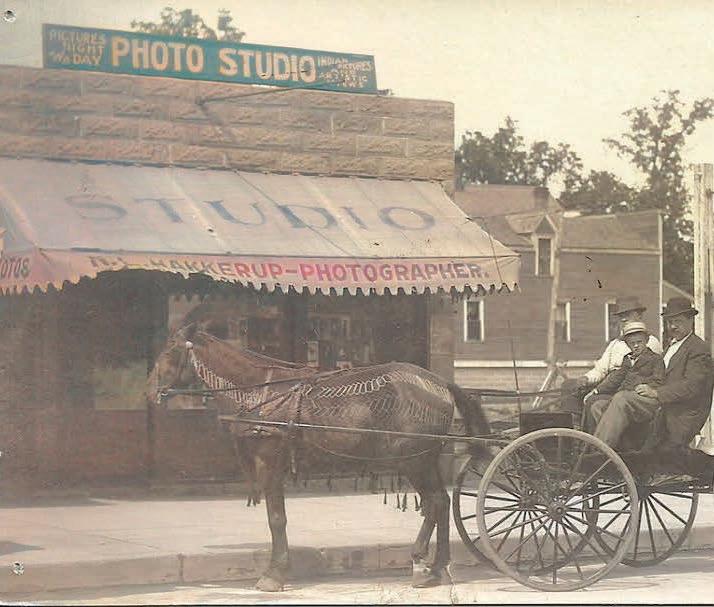
The Bemidji Karate Club met upstairs from about 1975 to 1978. The Bike Guy, Kirby Harman, had a bike shop with five employees. Twice but Nice was in the basement in 1989 before moving to 411 Beltrami Ave. Russ Jackson had the credit bureau on the lower level.
Many offices were housed in the building and accessed from the Fifth Street side including the law offices of McRae and McRae, the U.S. Army Recruiting Office, the Joint Economic Development Commission, Northern Psychological Services Inc., and David Moffett’s insurance agency.
The building is currently owned by Mitch Rautio. Appropriately, the west section of the building has a Q in the wrought iron work on the second floor and houses Q-107.1 managed by Phil Ehlke.
The main part of the street level was remodeled by a local chiropractor, Dr. Ryan Moeskau, but a change of plans took him instead to Boulder, Colo. The upstairs has several apartments with the largest one at the front of the building. These walls would have to talk a long time to unfold their many tales of occupants and visitors.
Our

10 | ANNUAL REPORT | Saturday, auguSt 26, 2023 | The Bemidji Pioneer BemidjiPioneer.com
otpco.com|
HakkerupPhotoStudio,1905 1123rdSt.(nowFozzie’s)
Poweringour communitieswith reliable,af fordableelectricity
companyisnamedaftertheOtter TailRiver,whichprovidedour firstsource ofelectricitywhen we becameanoperatingutilityin1909.
Courtesy / Beltrami County Historical Society
Workers repair the Bemidji Pioneer's sign at the corner of Fifth Street and Beltrami Avenue in this undated photo.
Madelyn Haasken / Bemidji Pioneer Siam Massage and Wellness Spa now occupies the building that once provided Turkish baths and for many years housed the Bemidji Pioneer at Fifth Street and Beltrami Avenue.
Courtesy / Beltrami County Historical Society
Bemidji Pioneer employees bundle newspapers in the basement of the building at Fifth and Beltrami in this undated photo.
Antique mall finds a home in historic hotel building
By Nicole Ronchetti
The Bemidji Pioneer
Just like so many of the items you can find inside, the building that houses the First City Antique Mall on the southeast corner of Second Street and Minnesota Avenue has an intriguing history of its own.
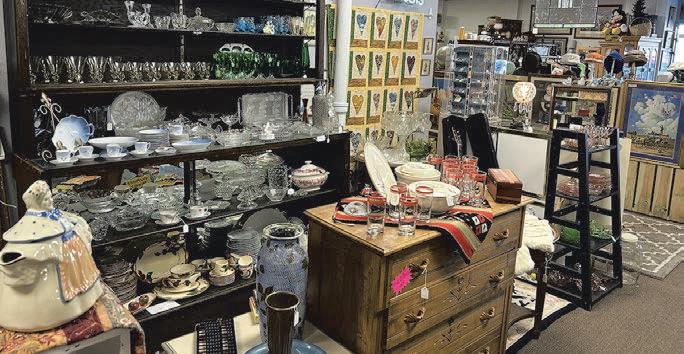

Its tale begins in 1919 when the land was purchased by Morris Kaplan with the intent to create a manufacturing plant.
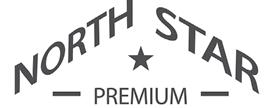




When he grasped how badly the city needed housing following World War I, he built a stateof-the-art hotel meant to service Bemidji’s growing population.

The building far exceeded the $30,000 estimate. Because of the swampy terrain between the Great Northern Depot and Second Street, the building had to be built on steel piers with a concrete foundation. The Bemidji Pioneer reported, “That it will be solidly rooted is a fact, for 380 large piles have been driven, upon which the structure will rest, said to be one of the strongest foundations in the state.” Steel beams were installed on both the first and second floors.
A huge 16,000-pound boiler was installed to provide steam heat for the structure. A pipeline was laid under Second Street to connect the Kaplan Block at 202204 Minnesota Avenue with this new structure. Kaplan’s Block north of Second Street housed Clifford & Co., which carried groceries, flour and feed.
While there was considerable excitement about the development, there was some disappointment with the plans, since an alternate dream for the land was a city park.
“With the purchase by Morris Kaplan of a large section of the block between First and Second Streets and Minnesota and Beltrami Avenues, the dream of our citizens that this section might be transformed into a city park will fade,” an article from the Pioneer lamented on May 8, 1919.
During the planning, Kaplan changed the layout of the interior several times. Instead of 40 single-room apartments, he changed the plans to 20 two-room apartments, two three-room apartments and 24 single rooms. The Pioneer reported in an article on
Jan. 13, 1920: “There will be 54 lavatories, 17 baths and 17 toilets. The two sides facing the streets will be enclosed by glass entirely, all of which has already arrived. Over 27,000 feet of maple flooring will be used in the new structure.”
After the hotel opened, it quickly became a landmark in town. Within the first year, the lower floors were home to a café, a floral company and even a harness shop.
One of the main demographics who occupied the hotel were young women stepping out on their own, a fact shared by Jan Burger, who owns First City Antique Mall and has researched the history of the building.
“One hundred years ago women wouldn’t get
apartments, but their parents would put them in a hotel that was considered a nice place,” Burger explained.
Serving as a safe and respectable place for a young lady to live in the early 1900s, the hotel saw success for the first decade of its existence. However, during the economic downturn of the Great Depression, the hotel fell into some difficulties and the lower floors were vacant from 1934 to 1935.
Business picked up as the economy recovered, with Bemidji Mercantile
Co. moving in downstairs. In 1937, young Olga Bjornstad was a clerk for
Morris Kaplan. By 1939, she was vice president of Bemidji Mercantile. By
1942, she was president of the company. She died in 1971. Sidney and Janice
Moe bought the Bemidji Mercantile from her estate and ran the company for 36 years.
Known as the Bemidji Hotel Apartments in the 1960s, just over a decade later a fire broke out on the third floor in January 1973, causing 60 residents to evacuate the building in the early morning.
While the damage was severe, repairs were made and the apartments reopened, rebranding to the Lakeview Apartments in 1978.
Bemidji Mercantile remained in the building until 2008 and the apartments remained on the upper floors. Tenants moved in and out and parts of the lower floor ultimately sat vacant before Burger and her business partners began leasing a section of the building in 2023.
While its historic nature wasn’t initially what drew them to the structure, it became an important part of why Burger and her partners chose the location.
“How perfect to put an antique business in a historic building,” Burger said. “I just think it was meant to be.”
Remnants of the building’s history remain, with the faded graphics of the Bemidji Hotel still visible on an exterior wall.
“The location tells a story,” Burger shared. “I love the fact that our downtown has so many wonderfully preserved old buildings.”
TRUST
Since 1992 our family has been dedicated to quality pet care for your pets. As fellow pet owners we understand that you have entrusted us with your pet




BemidjiPioneer.com The Bemidji Pioneer | Saturday, auguSt 26, 2023 | ANNUAL REPORT | 11 Lueken’s Village Foods North 1171 Paul Bunyan Dr NW, Bemidji, MN 56601 218-444-3663 Lueken’s Village Foods South 609 Washington Ave S Bemidji, MN 56601 218-444-8419
“North Star Premium products are available at these fine local partners.”
2014 Anne St. NW, Bemidji, MN 218-444-4738
as a part of your family and we take that seriously. We searched rivers, oceans, pastures, and fields for the highest quality ingredients from trusted and responsible sources. Each product is crafted with care and made in small batches to ensure the highest of standards. North Star Premium is proud to offer products that exceed expectations and deliver a premium product worthy of your noble companion.
Courtesy / Beltrami County Historical Society Morris
land on Minnesota Avenue in 1919 with the intent to create a manufacturing
state-of-the-art New Bemidji Hotel to service Bemidji’s growing population
Annalise Braught
Bemidji Pioneer
Kaplan bought the
plant,
but instead he built
the
after World War I.
/
The First City Antique Mall recently opened on the main floor of the building that was constructed after World War I to house the Bemidji Hotel at 120 Minnesota Ave. NW.
Dennis
Doeden / Bemidji Pioneer
The First City Antique Mall opened earlier this year at the southeast corner of Second Street and Minnesota Avenue.
Senior Center building has a storied past
By Annalise Braught
The Bemidji Pioneer
Some visitors to the Bemidji Senior Center have possibly been around long enough to know the history of what has taken place within its walls.
But for the average passerby, it might just seem like a regular old building from the 1970s as it is unlike the older-looking brick and stucco buildings lining the street. Other than its slightly unique, curved front exterior it doesn’t really stand out as a place with a storied past — but that isn’t the case.
Originally built in 1906, the building located at 216 Third St. NW in downtown Bemidji started out as the Brinkman Hotel and Theater. After prohibition ended in 1933, the city purchased the building in 1934, remodeled it and turned it into a Municipal Liquor Dispensary, which ran successfully until it burned down on Jan. 4, 1945, resulting in one fatality and a significant loss on Third Street, according to the Pioneer’s report at the time.
The lot sat empty due to a post-wartime economy until a few years later when the city let bids come in to build a new building, which is the one still there today.
The Bemidji City Council meeting minutes on July 10, 1947, included a resolution asking for bids to construct a new municipal liquor store. Bids on heating and electrical work on the new liquor store were accepted on Aug. 9, 1949, and it began operations around 1950.
The Oct. 10, 1953, edition of the Bemidji Pioneer detailed that as Bemidji’s now only liquor store, it produced greater net income in
remodeled it extensively. The new owners added 44 stools to the bar so that the place could seat about 200 people comfortably. Wrought iron railing was
“For nearly 40 years, ‘the Munie,’ Bemidji’s municipal liquor lounge served customers in the area,” a story in the Sept. 5, 1972, edition of

the operation and put the building up for sale. In April of this year (1972), the building was purchased, cleaned, remodeled, and re-decorated and on July 1 reopened as ‘Donavon’s.’ Since that time, it has already become a popular spot for area people for both meals and drinks.”
Donovan’s Bar and Lounge celebrated its grand opening on Sept. 6, 1972. By September 1975, advertisements were listed in the Bemidji Pioneer for the sale of the bar.
An article in the Sept. 25, 1976, edition of the Pioneer announced that Wilson’s Clothing store, owned by Bob and Jan Wilson, would be moving from 207 Third Street into the former Donovan’s location at 216 Third Street, which they had purchased earlier that year.
the building, the new store would offer over 8,000 square feet of display space, almost triple Wilson’s previous location. There were 6,000 square feet on the main floor and 2,000 in the “College Shop” featured downstairs. There were 19 fitting rooms on the two floors.
“The store, which was started by S.S. Wilson in 1920 in Bemidji, features fashions from some of the nation’s better retailers from New York, California and Dallas fashion markets,” the Pioneer article said.
In 1991, the Wilson Clothing store was purchased by the Bemidji Senior Center for $110,000 using individual donations, grants, fundraisers and a loan from First National Bank.
September 1953 than the town’s two stores yielded the same month the previous year.
According to Linda Lemmer, who worked for the city in the liquor store business from 1967-79, the Third Street liquor store had both onand off-sale liquor; the off-sale had a separate entrance in the curved section of the building, which is now the main entrance for the Senior Center.
The passage of a split liquor ordinance in 1971 forced the city to close the municipal operation and put the building up for sale.
In April 1972, Donavon Marchildon and his partner Frank Toonen purchased the building and
added for a special effect and a true likeness of Paul Bunyan adorned the rear interior wall.



the Pioneer reads. “The passage of a split liquor ordinance last year forced the city to close

The article detailed that following extensive remodeling to both the exterior and interior of
The Bemidji Senior Center has much to offer!
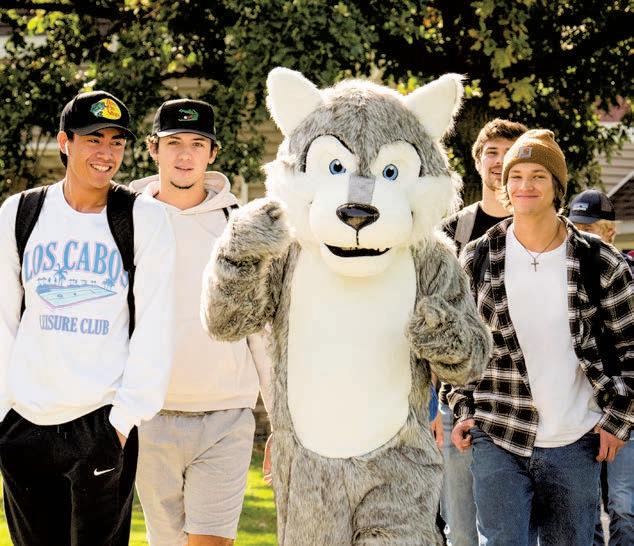
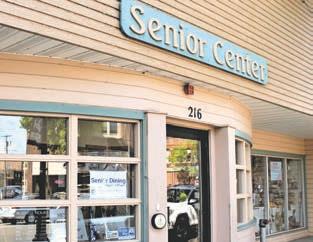
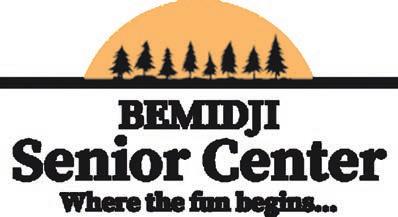
According to current Senior Center Manager Verna Lenker, the center incurred a heavy debt to buy the building with costs including the installation of an elevator, a sprinkler system, smoke alarms and air conditioners, as well as replacement of the roof at that time.
A total of 72 volunteers put in more than 7,000 labor hours to save the Senior Center approximately $90,000.
The Neilson Foundation, Otter Tail Power, Wiebolt Electric and Peterson Sheet Metal helped with roofing and air conditioning projects. Through the hard work of fundraising and individual donations, grants and charities, the Senior Center continues to reside in the storied building, providing activities and services for seniors in the Bemidji community and beyond.
They started in 1961 when a group of ladies decided to begin activities at the warming house in the City Skating Rink at 7th and American Avenue. In 1991, the Wilson Clothing Store was purchased and became the current home of the Bemidji Senior Center.
FUN AND GAMES:
• Mahjong-Mondays
• Cribbage-Mondays
• Pinochle-Thursdays
• Bingo-monthly
EXERCISE:
• Silver Stretchers
• Matter of Balance (MOB)
• Walk with Ease
• Line-Dancing
• Ballroom Dancing
MUSIC:
• Weekly Live Music Jams
• Monthly Classic Country Concerts
BOOK CLUB WOODCARVING CARD UPCYCLING
BUS TRIPS:
• State Fair-August 28th & 31st
• Neil Diamond ImpersonatorSeptember
• Capitol City Adventure (3days-2nights)-November
CLASSES:


• Art-Acrylic PaintingMetal Jewelry MakingHand Knitting
• Ceramic Painting
• THE FILE (Estate Planning)
MONTHLY PANCAKE BREAKFAST2ND SATURDAY
NEW ITEM FOR SALE IN THE GIFT SHOP:
• Pet Urns (They are beautiful, hand crafted with many different woods and designs)!
• Many more wonderful handmade gifts
12 | ANNUAL REPORT | Saturday, auguSt 26, 2023 | The Bemidji Pioneer BemidjiPioneer.com 218-751-8836 216 Third St. NW, Bemidji, MN 56601 Open 8-10:30am
Served 2nd Saturday
Pancakes
Monthly
DISCOVER YOUR CALLING. PURSUE YOUR PASSION. Applynowat oakhills.edu BEMIDJI,MN
Pioneer file photo
In April 1972, Donavon Marchildon and his partner Frank Toonen purchased the building located at 216 Third St. NW, remodeled it extensively and reopened as Donovan’s Bar and Lounge in 1972.
Annalise Braught / Bemidji Pioneer
The Bemidji Senior Center building, located at 216 Third Street NW in downtown Bemidji, has been home to several businesses over the years.
Troppman Block: Named for one of Bemidji’s early mayors
By Maggi Fellerman
The
 Bemidji
Bemidji
Pioneer
Located on the northwest corner of Minnesota Avenue and Third Street stands a tall, brick building many know as Troppman Block.

The current owner of the building, Jeanna Beyer, reopened her store called Trove and Tea to the community at the end of June after taking a two-year hiatus.
Today, Bemidjians can stop in and have a fresh fruit smoothie or boba tea, look through old records and find one-ofa-kind vintage items.
With beautiful brick walls and high ceilings, the Troppman building sits in the heart of the city – next to popular bars and restaurants, boutiques, coffee shops and bakeries. The inside of those walls have seen a whole slew of businesses come and go, extravagant parties, a couple of fires and countless renovations thanks to Fred Troppman himself.
It all started in the year 1898 when Fred M. Malzahn built his store.
At that time, it was the largest building in Bemidji standing two stories high, 50 feet wide and 140 feet long. Malzahn operated a general store on the first floor of his new building. A popular hotel and restaurant known as the Algoma Hotel was on the second floor and other offices were upstairs, including a surgeon’s practice and a millinery establishment.
In 1900, Malzahn expanded his general store into a department store with separate clothing, hardware and grocery departments. When Malzahn decided to retire in 1901, he announced that the three departments would be conducted by three different firms.

Fred O’Leary & Co. purchased the stock of clothing and dry goods. Joe Young purchased the grocery department and Mr. Cahill took over the hardware store while Malzahn retained ownership of the building.
Fred Troppman was the senior member of the firm of Troppman,
Ives, Young, and Co. and was active in the business scene in Bemidji as early as 1900. The firm owned the Bazaar Store which was housed in the Malzahn Block.
After Mr. Troppman purchased the Malzahn Block, it became the Troppman Block in the later part of 1903. The newspapers referred to the building as the former Malzahn Block for several years before it routinely referred to the building as the Troppman Block, though.
In November 1904, Ives and Young bought out the interest of Troppman in a cash deal and took over sole possession of the business. Eric Ives managed the Bazaar store and the building was a popular shopping destination.
In 1911, the Bazaar Store moved to 321 Beltrami Ave. Troppman made some major structural changes in July 1911. The building was lowered to the street level. New floors and new ceilings were put in, a new plate glass front was installed on the
Minnesota Avenue side. The roof was replaced, and a new coat of bottle green paint covered the outside walls. He opened his own general merchandise store in the building. Two years later, he added brick to the west and north walls to protect the building from fires which greatly improved the general appearance of the building. Troppman added more space for his sales room and expanded the apartments on the top floor along with the installation of a full basement
underneath his store.
When it was completed, it had three times the capacity it did before.
Throughout the years, the Troppman building saw many improvements but it also has been through a number of tragedies involving fires.
The most notable one was in 1931 when a fire broke out in the store which started at the south end of the basement and quickly filled the entire building with heavy smoke.
Troppman, his family and the other tenants who lived in the
apartments above the store were awakened at about 5:30 a.m. by cries of “fire” to find their rooms full of smoke and the stairway blocked by the dense cloud that came up from below.
Most of the stock in the store, the finish on the walls and the varnish on the desks of the Bemidji Business College which occupied part of the second floor at the time were all damaged considerably – the loss was set at $10,000 to $15,000.

In 1937 when Troppman was the mayor of Bemidji, he expanded the front of his building on the west by 25 feet and from the back by 90 feet. The addition was two stories high, giving him an additional four-room apartment overhead as well as a sun porch.
When Troppman passed away in 1970, the building then housed a shoe mart and a clothing store. It was the home of Ann Moran’s “Anntiques” store for several decades before it was occupied by the current store, Trove and Tea.

BemidjiPioneer.com The Bemidji Pioneer | Saturday, auguSt 26, 2023 | ANNUAL REPORT | 13 “Only what you need... at a price guaranteed” •Custom pipe bending •Custom duals for cars & pickups •4” diesel systems •Stock mufflers & pipes Locally Owned • Ray Appel • Andy Appel 219 Cars Ct NW - Bemidji • 1 block west of the high school 218-759-1264 “Only what you need... at a price guaranteed” •Custom pipe bending •Custom duals for cars & pickups •4” diesel systems •Stock mufflers & pipes Locally Owned • Ray Appel • Andy Appel 219 Cars Ct NW - Bemidji • 1 block west of the high school 218-759-1264 • Custom pipe bending • Custom duals for cars & pickups • 4” diesel systems • Stock mufflers & pipes Serving the Bemidji Area for 20 Years
Maggi Fellerman / Bemidji Pioneer
The Troppman Block, current home to Trove and Tea, has seen extravagant parties, a couple of fires and countless renovations thanks to Fred Troppman himself.
Submitted photo
An ad for the Malzahn General Store appeared in a 1901 edition of the Bemidji Pioneer. Malzahn built what is now known as the Troppman Block in 1898.
Charley Miles built ‘the most elegant building in town’
By Cecelia McKeig
Special to the Pioneer
One can only wonder what Charley Miles would think of the Northwest Minnesota Foundation building these days — one of the oldest buildings in town.
J.W. White had a grocery store on this prime corner. Miles bought the property in 1901 for an exorbitant $6,000, tore down the old building in July, and set out immediately to build the most elegant building in town.

The building was constructed of solid brick, 50 by 80 feet, two stories, with a rubble-style basement. The front was Menominee-pressed brick. The corner room of the street level became a first-class saloon, which he named the Golden Saloon. The adjoining room was for rent and the second story was fitted up for offices.
Miles wanted only the best. According to an old History Circle interview with Walter Brooks, the first president of the Lumbermen’s Bank and then Northern National, Miles was a nice appearing fellow, a very good dresser and courteous man. He could sign only his own name and that is all he knew.
He made quite a success of his business. He had all kinds of roulette machines, slot machines and poker tables, all wide open, and he couldn’t help but make money.
Miles also had the first automobile in Bemidji. It was a two-door Ford painted a brilliant red. It was quite a car, but the trouble was that when one wanted to start it, the sand on Beltrami Avenue was so deep that the wheels spun, and his friends always had to give it a push.
Miles gave the ladies of the Spiritualist Church the privilege of opening his new brick block, and the ladies set about planning a social for Oct. 15 which included a dance, a supper and a second repast at midnight. Of course, Cora Kincannon Smith, the minister of the Spiritualist Church in Bemidji, was the wife of Ted Smith, owner of the Three Guardsmen Saloon on Second Street, where the Spiritualists often held their meetings on the second floor.
L.H. Bailey and H.J. Loud moved into the two front office rooms upstairs and secured an adjoining room for their law library. The quarters
were described by a local reporter:
“The upstairs rooms in the new Miles block have been completed and finished up in elegant shape, and they are simply perfection in finish, heating, ventilation and lighting facilities, and the occupants may well feel proud of their new quarters. The walls are plastered, with hardwood wainscoting and floors. The hallway is wide, adding to the general appearance of the interior.”
A month later Dr. Morrison had two rooms in the building, one to be used as an operating room and the second as a reception room. The telephone company moved into two of the rooms.
Other tenants soon followed, including a land agent and a dentist. A new physician, Dr. Roland Gilmore, engaged a suite of office rooms in the Miles block in 1902. Lee Scotland purchased the practice of Dr. James in 1977 and moved his dental practice into rooms on the second floor and stayed there for decades.
Changing course
James L. George and Edwin Gearlds purchased Miles’ saloon business in September 1908, and Clyde Bacon purchased the entire block a month later. Bacon was accompanied by A.P. White, president of the Lumbermen’s National Bank, who acted as financial agent.
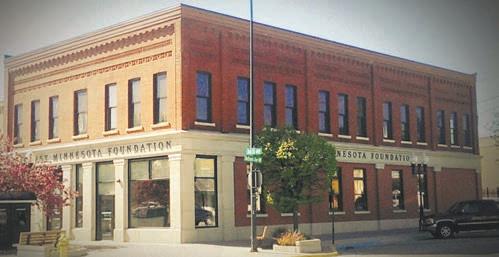
The rentals from the tenants of the building brought in a consistent income and the purchase was considered a splendid investment. The price tag was reportedly $35,000, which is roughly the equivalent


buying power of $8 million today. Gearlds vacated the building after a year, and the Lumbermen’s National Bank of this city moved into the corner rooms of the building in January 1910. At about the same time, the bank received permission from Washington to change its name. As of Dec. 29, 1909, the Lumbermen’s Bank converted its name to Northern National Bank.
While Miles owned the building, the entrance to his Golden Saloon was at 301 Beltrami Avenue. The entrance was obviously changed after the corner rooms were converted into a bank.
Thanks to the elegant taste of Miles, the new quarters were “specially fitted for the reception of the most pretentious and elegant banking furniture and fixtures ever placed in a financial institution in Minnesota outside the twin cities.”
A description of the building, when it was


Northern National Bank, emphasized the elegance of the interior. The lobby was constructed of glazed brick
and oak-finished wood.
Fixtures and furnishings were of beautiful Italian and white marble, and much of the wood used in the buildings was heavy mahogany.
There were two large vaults, one on the main floor and a second one in the basement. These two are still in the building for obvious reasons. Although unused, how would you remove them?
The front windows of the bank housed many displays of interest over the years supporting current interests ranging from patriotism to holidays. Northern National Bank merged with Norwest Bank in 1996 and evolved into Well Fargo until it moved about

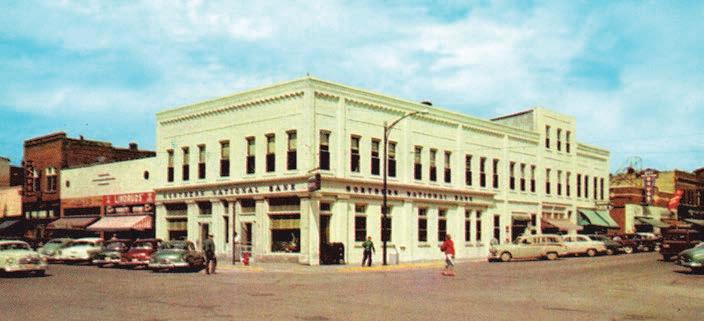
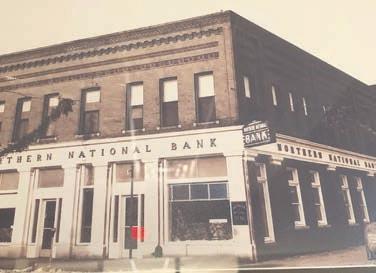
2011. The Northwest Minnesota Foundation bought the building and remodeled the two floors for its purposes. Bethany Wesley, the communications director of NMF, hosted a tour of the building as it now exists. Immediately upon entering the lobby, one’s eyes go to the elegant mosaic tiles on the floor which represent the areas that the foundation serves. The mosaics were designed by Darci Thabes, an area artist. Farming, wild rice harvesting, snow-capped pine trees, and snowshoeing are all included.
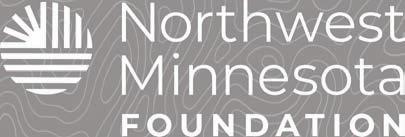
The workspace is divided into meeting rooms and offices and each of the six areas are named for regional state parks: Hayes Lake, Itasca, Lake Bemidji, Lake Bronson, Old Mill and Zippel Bay. The art displayed in each area was carefully chosen by an art committee to fit with the theme.
The intrigue for a historian, however, is a tour of the basement. Stairs and a door that goes nowhere, openings for coal chutes, and multiple facades of the walls show the changes over time. Massive beams and supports confirm the quality of the early construction. A piece of floral fresco above one door makes one wonder what possibly was in that room to deserve so much elegance. Did Miles have a dining room down there? Was it possibly a meeting room at one time? Why do we wait so long to gather history?
14 | ANNUAL REPORT | Saturday, auguSt 26, 2023 | The Bemidji Pioneer BemidjiPioneer.com JOINUSININVESTINGINTHEFUTURE! Put your passions, ideas, and intentions into action. Consider leavingalegacy that will support generations to come. www.nwmf.org/give-now Wetreasureyesterday,while workingtoward abettertomorrow. Weconnectpeopletoresources. Fromgrants,loans,andscholarshipstobusiness consultingandlocalgiving,weguideandsupportdonors andrecipientsalike.Needourhelp?Let'stalk!
Maggi Fellerman / Bemidji Pioneer
The Northwest Minnesota Foundation now occupies the elegant building on the northwest corner of Third Street and Beltrami Avenue.
Courtesy / Beltrami County Historical Society
In 1909, the Lumbermen’s Bank changed its name to Northern National Bank, which remained until 1996 when it merged with Norwest Bank.
Courtesy / Beltrami County Historical Society With Northern National Bank as a backdrop, contestants in a pancake race head east on Third Street in this undated photo.
Mayflower: ‘There’s just something about the building’
By Nicole Ronchetti The Bemidji Pioneer
The detailed brick walls of the Mayflower Building have welcomed people to downtown Bemidji for well over a century, first as a wholesale grocery house and now as a hub for local entrepreneurs and as a building emblematic of looking toward the future of Bemidji.
First constructed in 1909, the structure began its tale with the Bemidji Wholesale Grocery Company as the first business of its kind in the city.
The building, which measured 75 by 100 feet and included a basement, would be the only wholesale grocery house in the region — the closest otherwise being in Duluth or Brainerd.
The venture was started with $50,000 in capital and very quickly became an integral part of Bemidji’s business landscape.
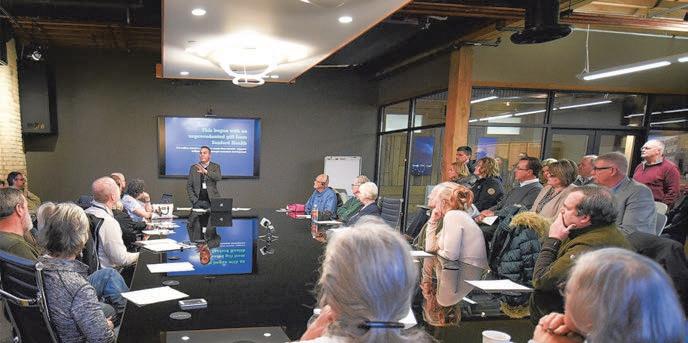

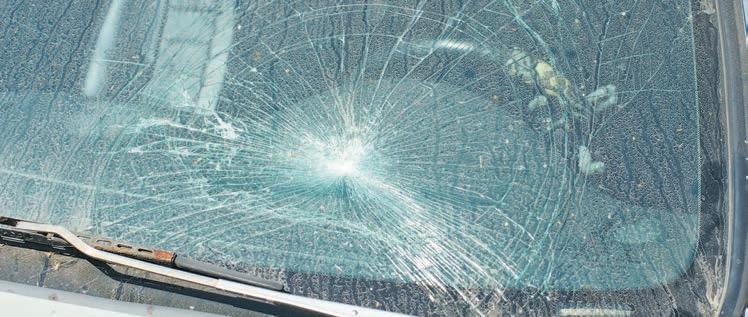
It remained under the same ownership until Aug. 3, 1921, when it was sold to the Nash Finch Company. The Pioneer published the sale’s announcement from Bemidji Wholesale Grocery, then known as Northern Grocery.
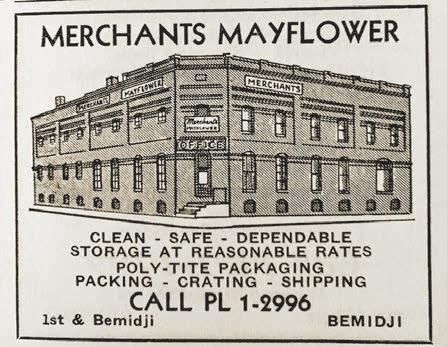
“We have today sold our business Finch Co,” the announcement wrote. “The Northern Grocery Company built the three-story, new brick building, in which it has been housed, in 1909, and have in the intervening years built up a splendid wholesale business which has made Bemidji noted as a wholesale and distributing center.”
The structure became the Nash Finch Company Wholesale Groceries and Fruit, which it remained for over 30 years until

1956.
Over the ensuing decades, it housed Bemidji Bus Lines, the Mayflower Moving Company and Merchants Transfer, before Kraus-Anderson Construction purchased the property in 1986 with the intent to turn it into a retail space.
“Kraus Anderson made it into a retail indoor shopping space which had on the upper level a restaurant and then on the main level many businesses that are still around today, like Giovanni’s Pizza and Chocolates Plus,” said David Hengel, executive director of Greater Bemidji, which now owns the building. Snow Goose Gifts also was on the main level.
Many people also remember the top floor being occupied by Stats Sports Bar and later Knockouts Sports Cafe in the late 1990s and early 2000s. After Knockouts closed, most of the businesses inside the building found other locations.

For a while, the structure had an odd list of tenants, even serving as the location of Voyageurs Expeditionary High School until it moved to its current location before it was purchased in 2014 by Greater Bemidji.
A major renovation followed, preserving and highlighting the historic nature of the building while adding modern and high-tech amenities to accommodate Greater Bemidji’s vision.
“We wanted to have a facility that would wow companies that were coming to Bemidji for the first time, with high technology that was also in the context of the old history of our community,” Hengel explained,
The Mayflower Building serves as a hub for local businesses, with Greater Bemidji, the Bemidji Area Chamber of Commerce and LaunchPad Bemidji all working out of its century-old walls.

“(The building) kind of told the story of Bemidji. We have a deep pride in our past and are also looking into the future,” Hengel said. “There’s just something about the building, it’s just a really amazing space.”
Sadie Rae’s Quilt Shop

BemidjiPioneer.com The Bemidji Pioneer | Saturday, auguSt 26, 2023 | ANNUAL REPORT | 15 AUTO GLASS REPAIR OR REPLACEMENT 211 Paul Bunyan Drive | Bemidji, MN (2 Doors West of Hardees) Call us! 218-444-7587 (PLUS) | www.detailplusbemidji.com We Specialize in Windshield Replacement & Repair. We Accept All Insurance Companies. Serving the Bemidji Area since 1997! IS MOVING! NEW ADDRESS: 430 Old Whitetail Drive Wilton, MN 218-444-2387 sadieraes21@yahoo.com www.sadieraesquiltshop.com
“and that was really what we did.”
Submitted photo
This advertisement for Mayflower Moving Company and Merchants Transfer appeared in the 1963 Bemidji telephone book.
Pioneer file photo
The Jim Bensen Board Room at the Mayflower Building has hosted many community meetings in recent years under Greater Bemidji's ownership.
Pioneer file photo
Kraus-Anderson Construction purchased the Mayflower Building in 1986 and turned it into a retail space.
Annalise Braught / Bemidji Pioneer
The historic Mayflower Building is now home to Greater Bemidji, the Bemidji Area Chamber of Commerce and LaunchPad Bemidji.
New salon preserves memories of former T. Juan’s
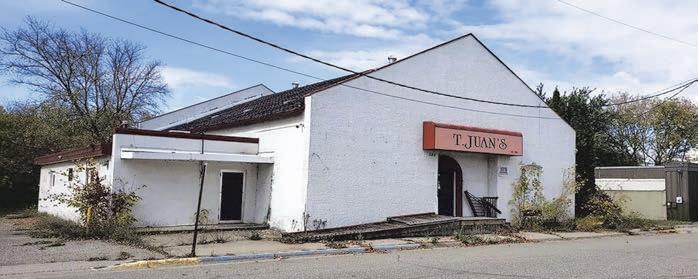 By Dennis Doeden The Bemidji Pioneer
By Dennis Doeden The Bemidji Pioneer


Many Bemidjians
fondly remember it as
T. Juan’s Restaurante & Cantina, the town’s go-to Mexican spot.
But the location on Park Avenue on the western edge downtown also held Bemidji’s Light and Water Plant, a couple of trucking companies, beer distributors and even a can and bottle recycling center.
After sitting empty for more than 10 years, it’s now home to the Hair Affair Salon and Spa, which moved there earlier this year after an extensive remodeling project.


“Anybody who’s from Bemidji knows T. Juan’s,” said Calyn (Hensel) Lalone, owner of the salon. “And if they didn’t live here they went to college here and have come back. We’ve actually had people just walk in just to see the original painting of
T. Juan.” Calyn and her husband, Matt, purchased the building on Dec. 31, 2020, and started gutting the place the next day. Ironically, the couple had their first date at T. Juan’s. Now they had to decide how to preserve some of what once was their favorite restaurant while creating an inviting space for customers.
“The tables were still set for diners,” Matt said. “It was a full two years of removing everything and selling everything that was salvageable. All of the kitchen equipment was in working order. We utilized as much of the kitchen equipment as possible, all stainless steel.
We saved table tops from T. Juan’s, saved as much wood as possible and used it all for our shelving.”
They also discovered something from the building’s past. It was a sign on a door and pipes
from the Warfield Electric Company, the original owners.
According to Bemidji historian Cecelia McKeig, Bemidji’s Light and Water Plant was constructed on the site in 1904, and four years later a steel water tower at the end of Third Street was built alongside Warfield’s light and water plant.
Among other occupants through the years were Midnite Express Trucking, Glendenning Motor Ways, Bemidji Distributing Co., and Honest Oly’s Used Can and Bottle Lot.
Midnite Express had daily trucking service between Bemidji, Duluth, the Twin Cities, Fargo and Grand Forks. Bemidji Distributing served as storage for the Langdon Bottling Co. and Nichols & Shanahan Beverage.
Bemidji Distributing was one of the oldest wholesalers in Minne-


sota and the oldest in Bemidji, going back to 1933. In April 1974, the company introduced Olympia beer in Bemidji.
In 1976, Honest Oly’s made a Bicentennial pledge to the community to buy any and all crushed aluminum cans returned to the Recy-
cling Center for 15 cents a pound.

But most people know the building best as T. Juan’s. In addition to the popular Mexican cuisine, legend has it that the place tried to set a Guinness world record for serving the most shots of tequila on Cinco de Maio
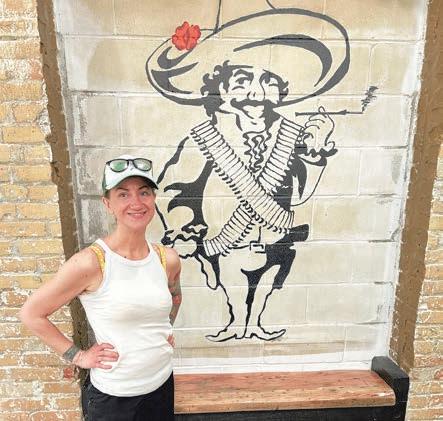
one year.
“I used to come here and play pool, throw darts,” Matt Lalone said of the place he now co-owns. “When we started to hear a lot of firsts from people, we thought, ‘Let’s not cover everything up, let’s try to keep some of it the same.’ We kept the floor, just sealed it. You can see where the bar was. You can see where the family booth was.”
They also kept an old, heavy safe that was still in the building.
“There are so many buildings in our town that have been torn down that are extremely nostalgic and important to people,” Calyn Lalone said. “So to take something that has been in Bemidji since roughly 1908 … and revamp it and make it into such a modern space for people to come and enjoy and relax, is really amazing. There are no words. I think it was meant to be for us to buy this building.”
with us!

16 | ANNUAL REPORT | Saturday, auguSt 26, 2023 | The Bemidji Pioneer BemidjiPioneer.com 1632 Bemidji Ave N. • Bemidji, MN 218-751-2801 www.HigginsHeating.com Home Comfort and Air Quality Specialists Serving you since 1946! Get your A/C & Furnace Cleaned & Checked! • RESIDENTIAL & COMMERCIAL • SERVICE & INSTALLATION • CENTRAL AIR • HEATING • AIR CONDITIONING • HEAT PUMPS • MINI SPLIT SYSTEMS • COMMERCIAL REFRIGERATION Financing Now Available! Fi rstPresbyteria nChu rch Be midj i'sFirst Ch urch Since 1896 ATraditional Presby terian Church locatedonthe corner of Fifthand Minnesota 501Min nesota Ave•218 -444-5016 presbji@pa ulbu nyan.net •firstpresbji.com APLACE TO CALL HOM E Bu ildin gr elationshipson eatat im e SU NDAY WO RS HI P 10:00am FE LLOW SH IP 1st and3rd Sundays 11:00am followingWorship CO MMUNI ON FirstSundayofthemonth PA STOR CH IP HOLT, CR E Come seek GOD
Madelyn Haasken / Bemidji Pioneer
Calyn and Matt Lalone purchased the former T. Juan's building at 305 Park Ave. NW in 2020 and remodeled it to house Calyn's business, The Hair Affair.
Contributed
The T. Juan's building was vacant for more than 10 years before the Lalones purchased it to house The Hair Affair.
Dennis Doeden / Bemidji Pioneer
The Hair Affair owner Calyn Lalone says curious visitors have stopped in just to see the old painting of T. Juan.













































 By Madelyn Haasken
The Bemidji Pioneer
By Madelyn Haasken
The Bemidji Pioneer







































































 Bemidji
Bemidji





















 By Dennis Doeden The Bemidji Pioneer
By Dennis Doeden The Bemidji Pioneer








